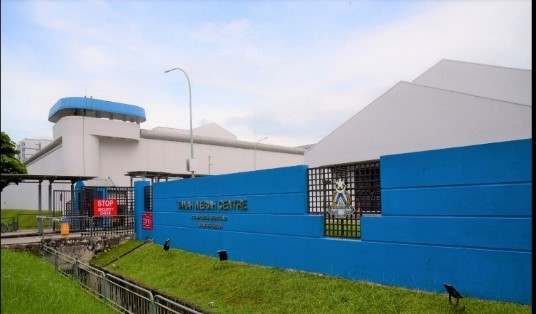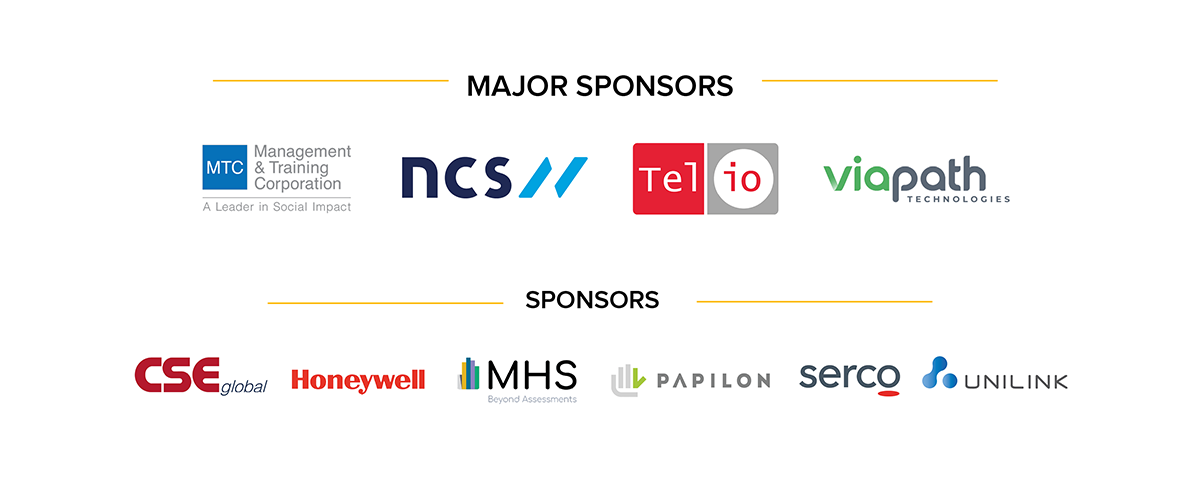- You are here:
- Homepage
- Events
- Past Events
- ICPA Annual Conference 2024
- Programme

Full Programme
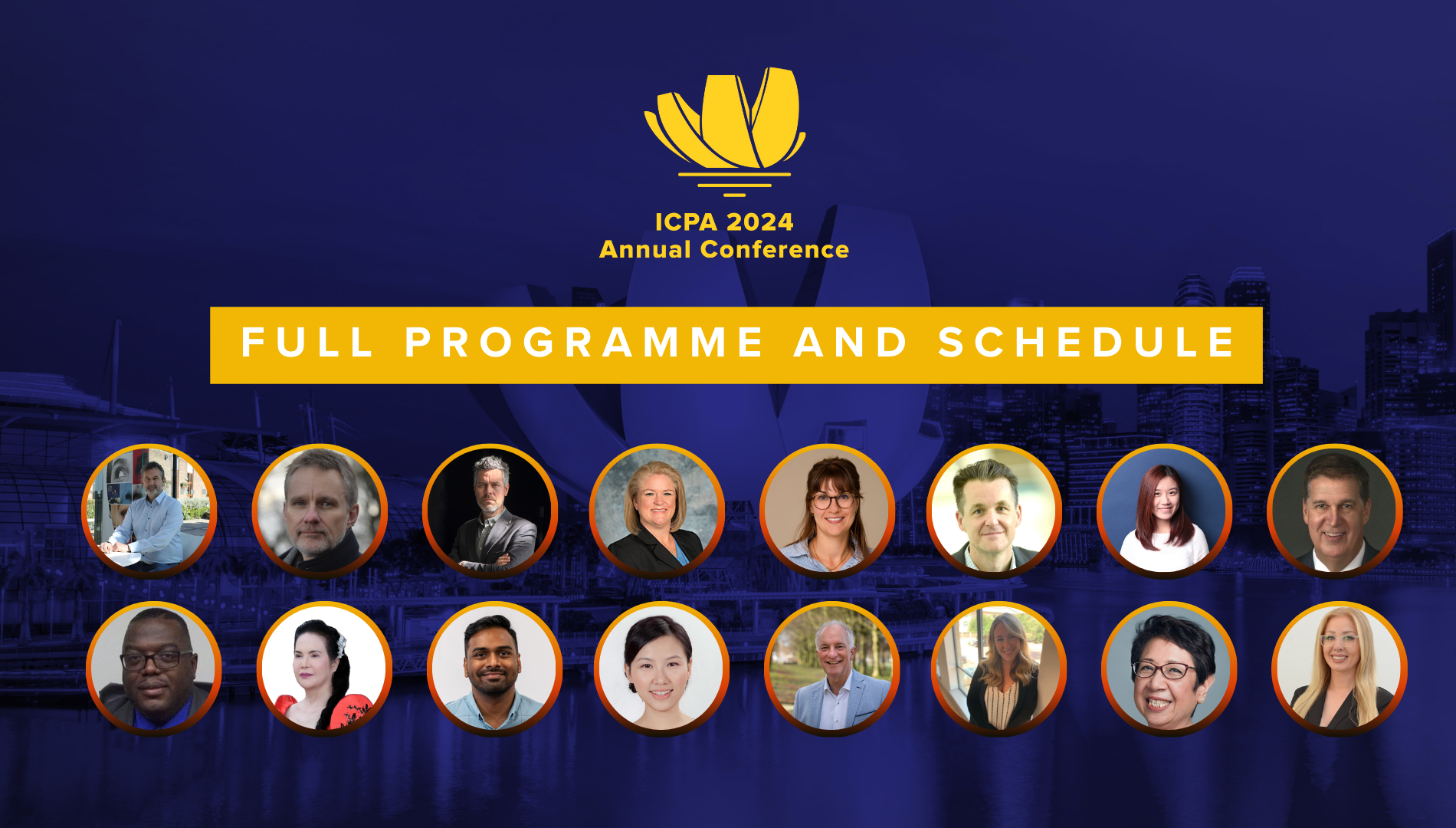
Yellow Ribbon Prison Run 2024
Yellow Ribbon Prison Run 2024
Yellow Ribbon Prison Run 2024
5.20am – 10.30am EDT, 1 September 2024 ‐ 5 hours 10 mins
Yellow Ribbon Prison Run 2024
The return bus to the Grand Copthorne Waterfront Hotel will leave Changi Prison Complex at 10:30 AM. Please meet at the VIP tent at 10:20 AM.
Opening Ceremony
Plenary Session
Opening Ceremony
8.30am – 8.45am EDT, 2 September 2024 ‐ 15 mins
Plenary Session
Welcome and Introductions
Plenary Session
Welcome and Introductions
8.45am – 9am EDT, 2 September 2024 ‐ 15 mins
Plenary Session
Speakers

Opening Speech
Plenary Session
Opening Speech
9am – 9.15am EDT, 2 September 2024 ‐ 15 mins
Plenary Session
Speakers
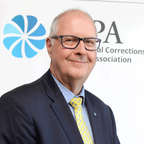
Host Country Speech
Plenary Session
Host Country Speech
9.15am – 9.30am EDT, 2 September 2024 ‐ 15 mins
Plenary Session
Beyond Recidivism: Keynote Presentation (PID220)
Plenary Session
Beyond Recidivism: Keynote Presentation (PID220)
9.30am – 10.30am EDT, 2 September 2024 ‐ 1 hour
Plenary Session
- Some studies define recidivism as a return to custody for a serious parole violation and/or being convicted of a new crime, while others also include arrests in their definition of recidivism.
- Research studies do not measure recidivism using a consistent time period. Some just look at a six-month period while others measure recidivism at two, three, or more years.
- Information about individuals with justice involvement is fragmented. There is no centralized database of information about individuals in local, state, tribal and/or federal justice systems.
- Recidivism measures failure.
- Success is more than not returning to prison. Success should be evaluated across multiple areas of a person’s life, including employment, housing, health, pro-social connections, personal well-being, etc.
- Measuring recidivism does not provide any information about the impact of desistence factors. As a result, practitioners cannot see which parts of a program were effective and should be replicated.
1. An understanding of the limitations of recidivism as a measure of post-release success;
2. Examples of the use of desistence to support success in reentry;
3. Tools and resources that will more accurately measure the effectiveness of programs and services in supporting the post-release success of an individual;
4. An examination of specific NGO reentry programs and measurement tools; and
5. An overview of select international examples of measuring success "beyond recidivism."
Speakers

Denise M. Robinson
President and CEO, Alvis Inc, President, American Correctional Association (ACA), United States
Break and Exhibition
Coffee Break
Break and Exhibition
10.30am – 11am EDT, 2 September 2024 ‐ 30 mins
Coffee Break
Collaboration in Africa: Rwanda, Uganda, Kenya and the SAW Project (PID091)
Workshop Session
Collaboration in Africa: Rwanda, Uganda, Kenya and the SAW Project (PID091)
11am – 11.45am EDT, 2 September 2024 ‐ 45 mins
Workshop Session
Speakers


Alex Mugisha
Director of Cooperation & Peace Support Operations, Rwanda Correctional Service, Rwanda

Nuruh Mbalyowere
Principal Rehabilitation and Reintegration Officer, Uganda Prisons Service, Uganda

Dr Humphrey Young Ogola PHD, HSE
Technical Advisor, State Department for Correctional Services, Kenya
Identification and Support for Children with a Family Member in Prison - What Works and What are the Challenges? (PID016)
Workshop Session
Identification and Support for Children with a Family Member in Prison - What Works and What are the Challenges? (PID016)
11am – 11.45am EDT, 2 September 2024 ‐ 45 mins
Workshop Session
This talk will discuss nationwide provision in the UK for children who have a family member in prison, and the barriers that currently exist with regards to early identification of these children so that support can be put in place when it is critically needed. This talk will also discuss introduce key findings from the new report ‘From arrest to release, helping families feel less alone: An evaluation of a Worcestershire pilot support project for families affected by parental imprisonment’ (Cooper, Payler, Bennett & Taylor, 2023). Current provision within the criminal justice system focuses on supporting and rehabilitating the imprisoned adult and fails to consider much broader and intergenerational needs of families.
Speakers

Dr Stephanie Bennett
Senior Lecturer in Criminology and Forensic Psychology, University of Chichester, The Open University, England, United Kingdom
Employing Intelligence Tradecraft to Achieve Long-Term Desistance (PID141)
Workshop Session
Employing Intelligence Tradecraft to Achieve Long-Term Desistance (PID141)
11am – 11.45am EDT, 2 September 2024 ‐ 45 mins
Workshop Session
Often people either maintain criminal relationships during their term of imprisonment, and in some cases make new associations within the prison environment which can make motivation to cease criminal activity on exit difficult.
Corrections intelligence not only supports the safety and security of the correctional environment, when structured and backed by supporting governance intelligence can also motivate people to desist in engaging with criminal networks both within prison and within the community who often can forcibly promote re-offending.
A Winston Churchill Fellowship on international best practice in corrections intelligence provided a number of findings which Helen will share including her assessment around the enhanced collaboration she observed between correctional agencies, law enforcement and national security partners.
Operationalizing the Nelson Mandela Rules in INL Correctional Engagements (PID005)
Workshop Session
Operationalizing the Nelson Mandela Rules in INL Correctional Engagements (PID005)
11am – 11.45am EDT, 2 September 2024 ‐ 45 mins
Workshop Session
Speakers

Richard I. Robinson
Senior Corrections Advisor, US Department of State - INL KM/TAD, United States

Shannon McReynolds
Senior Corrections Advisor, US Department of State - INL KM/TAD, United States
Digital Services for Incarcerated Individuals: How to Balance Freedom with Security for Successful Rehabilitation Programs (PID226)
Workshop Session
Digital Services for Incarcerated Individuals: How to Balance Freedom with Security for Successful Rehabilitation Programs (PID226)
11am – 11.45am EDT, 2 September 2024 ‐ 45 mins
Workshop Session
In this presentation, Renee Van Aaken from Correctional New South Wales and Christopher Ditto of ViaPath Technologies will delve into the complexities of designing and implementing digital services for incarcerated individuals. Leveraging their joint experiences in rolling out 10,000 tablets across New South Wales, along with other digital initiatives in North America, the presentation will highlight how digital tools significantly contribute to reducing recidivism by providing controlled access to external resources. The presentation tackles the vital issues of selecting appropriate content, establishing digital communication policies, and countering incarcerated individuals’ efforts to circumvent security protocols. Through practical examples, Van Aaken and Ditto will offer insights aimed at finding the ideal balance between security and rehabilitative potential, including, presenting a strategic approach to managing digital freedoms which aims to ensure that digital access is both secure and conducive to rehabilitation. This presentation offers a forward-thinking approach to digital integration in correctional settings and is designed for an audience that spans technical experts to laypersons involved in or contemplating the introduction of tablet programs in correctional environments.
Speakers

Renee Van Aaken
Director, Delivery Performance and Culture, Correctional Services, New South Wales Department of Communities and Justice, Australia

Christopher Ditto
Senior Vice President of Research & Development, ViaPath Technologies, United States
Healthcare Network
Workshop Session
Healthcare Network
11am – 12.30pm EDT, 2 September 2024 ‐ 1 hour 30 mins
Workshop Session
- Identify and share evidence-based practices of physical and mental health care and wellness;
- Protect universal principles of medical ethics, professionalism, confidentiality and patient autonomy;
- Promote health training, sensitization and wellness programs among staff and incarcerated persons;
- Support and promote the United Nations Mandela and Bangkok Minimum Rules and other international principles and agreements;
- Advance professional education and awareness of the health needs of persons in prison to health and corrections leadership and the broader community;
- Encourage models of throughcare for persons released from prison and rehabilitation;
- Identify and share practice advances that involve new technologies and improve healthcare;
- Contribute articles to ICPA publications, participation in ICPA trainings, and involvement in other ICPA activities;
- Advance treatment sessions for ICPA conferences on topics such as nutrition and food security, contagious disease, mental illness, isolation, addiction, aging, chronic illness, suicide prevention, populations with special needs and public health.
Speakers

Wendy Hoey
Chief Executive, Justice Health and Forensic Mental Health Network NSW, Australia
The UTurn Construction Pathways Program – Engaging with the Construction Industry and Community (PID017)
Workshop Session
The UTurn Construction Pathways Program – Engaging with the Construction Industry and Community (PID017)
11.45am – 12.30pm EDT, 2 September 2024 ‐ 45 mins
Workshop Session
Speakers

Practice Transfer: ICPA's 2024 Focus on Parenting from Prison and Family Engagement (PID197)
Workshop Session
Practice Transfer: ICPA's 2024 Focus on Parenting from Prison and Family Engagement (PID197)
11.45am – 12.30pm EDT, 2 September 2024 ‐ 45 mins
Workshop Session
Speakers



Seow Ling
Co-Executive Director of Lutheran Community Care Services, Singapore Prison Service, Singapore

Viknesswari Nadarajan
Harnessing Technology for Desistance: Facilitating Successful Reintegration (PID131)
Workshop Session
Harnessing Technology for Desistance: Facilitating Successful Reintegration (PID131)
11.45am – 12.30pm EDT, 2 September 2024 ‐ 45 mins
Workshop Session
Speakers

Enabling Desistance in Prisons and Correctional Institutions: A Multifaceted Approach: Zimbabwean Perspective (PID209)
Workshop Session
Enabling Desistance in Prisons and Correctional Institutions: A Multifaceted Approach: Zimbabwean Perspective (PID209)
11.45am – 12.30pm EDT, 2 September 2024 ‐ 45 mins
Workshop Session
The Zimbabwe Prisons and Correctional Service (ZPCS) developed better approaches to incarceration, rehabilitation and reintegration in enabling desistance to create safer societies. The motivation of development of these approaches that seek to address recidivism by ZPCS was necessitated by challenges of overcrowding, dietary constraints, recidivism and health related insecurities. The Zimbabwean correctional system is premised on incarceration, rehabilitation and successful reintegration. Therefore, desistance becomes the desired outcome of incarceration and rehabilitation practices in the ZPCS. Desistance is enabled through the provision of effective rehabilitation of inmates for their successful reintegration back into societies. This was necessitated by ratifying international protocols and conventions that advocated for minimum standards on treatment of offenders. Thus, ZPCS is constitutionally mandated to implement such protocols and conventions to protect society from criminal elements through incarceration and rehabilitation of offenders for successful reintegration. In addition, behavioural and psychological intervention approaches address the root causes of criminal behavior and provide inmates with the tools and resources essential for successful reintegration. The skills acquisition approach introduces programs and initiatives aimed at helping offenders develop job related skills and other capabilities that improve prospects of successful reintegration. This encompasses correctional industries in the ZPCS to promote employability and economic stability of ex- inmates, a dimension that inform smooth reintegration into the society. Prison Employment Programs support the wellbeing of inmates to cater for their families whilst serving. Overall, enabling desistance requires multifaceted and systematic approaches that calls for robust collaboration and partnerships, conformity and alliance with international best practices.Speakers
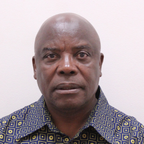
Moses Cyril Ngawaite Chihobvu
Commissioner-General, Zimbabwe Prisons And Correctional Service, Zimbabwe

Ison Ndoro

Trauma-informed care and staff wellbeing in prisons and jails: A systematic review and synthesis of global evidence (PID020)
Workshop Session
Trauma-informed care and staff wellbeing in prisons and jails: A systematic review and synthesis of global evidence (PID020)
11.45am – 12.30pm EDT, 2 September 2024 ‐ 45 mins
Workshop Session
Speakers

A Primer on Artificial Intelligence and Machine Learning in Corrections (PID227)
Workshop Session
A Primer on Artificial Intelligence and Machine Learning in Corrections (PID227)
11.45am – 12.30pm EDT, 2 September 2024 ‐ 45 mins
Workshop Session
In this program, attendees will gain a foundational understanding of how Artificial Intelligence (AI) and Machine Learning (ML) can be successfully applied to the corrections industry. Christopher Ditto and Eric Gonzalez of ViaPath Technologies along with Murat Aydemir of Ericom will share compelling case studies that demonstrate the practical applications and successes of AI and ML in correctional facilities. The presentation will conclude with a discussion on emerging technologies that are poised to impact the future of corrections. This interactive session will welcome questions throughout.
Speakers

Christopher Ditto
Senior Vice President of Research & Development, ViaPath Technologies, United States

Eric Gonzalez
Executive Director of Technology International, ViaPath Technologies, United States

Lunch and Exhibition
Lunch
Lunch and Exhibition
12.30pm – 1.30pm EDT, 2 September 2024 ‐ 1 hour
Lunch
Research to Practice: Improving Correctional Wellness by Using What We Already Have (PID217)
Plenary Session
Research to Practice: Improving Correctional Wellness by Using What We Already Have (PID217)
1.30pm – 3pm EDT, 2 September 2024 ‐ 1 hour 30 mins
Plenary Session
Many individuals working within carceral systems express a desire to help; to enhance safety and security while offering pro-social experiences that improve lives and can lead to desistance. Yet, too often, the carceral system creates seemingly insurmountable hurdles and obstacles so that achieving rehabilitative and pro-social goals feels impossible. Reforms are needed, but budgets are tight, staffing is critically low, and resources are scarce. Perhaps some good news is how some of what carceral institutions need to do, to create innovation to improve wellness, is already in place both within correctional facilities and the broader community.
In this panel, four carceral scholars from the U.S. and Canada examine and explore existing resources that are often overlooked and underutilized…resources, that when used to capacity, could show dramatic wellness improvements for prison/jail staff and residents. The four presentations will highlight: 1) faith-based and peer navigation programs; 2) strengthening relational connections with community; 3) the importance of enhancing the capacities of medical and healthcare systems, and 4) the moral and perceptual importance of carceral work. Blending empirical data and theoretical frameworks, these scholars present several hopeful alternatives to the often bleak carceral landscape and suggest a future where both carceral staff and residents learn, grow, and flourish in ways that improve wellness outcomes for themselves, their families, and the communities they call home.
Speakers


Kevin Wright PhD
Director, Arizona State University Center for Correctional Solutions, Arizona State University, United States
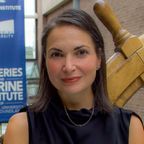
Professor Rosemary Ricciardelli
Professor and Research Chair: Safety, Security, and Wellness, Memorial University of Newfoundland, Canada

Break and Exhibition
Coffee Break
Break and Exhibition
3pm – 3.30pm EDT, 2 September 2024 ‐ 30 mins
Coffee Break
Bridging Implementation Gaps of the Bangkok Rules: Towards ICPA Women in Corrections Conference 2025 (PID202)
Workshop Session
Bridging Implementation Gaps of the Bangkok Rules: Towards ICPA Women in Corrections Conference 2025 (PID202)
3.30pm – 4pm EDT, 2 September 2024 ‐ 30 mins
Workshop Session
The Thailand Institute of Justice (TIJ), in partnership with the United Nations Office on Drugs and Crime (UNODC), has initiated the project “Renewing our promise: Fostering progress and investments to advance the application of the Bangkok Rules” to bring together stakeholders and practitioners to share valuable insights on the progress, challenges, promising initiatives in women’s corrections and reintegration in different regions around the world, including Asia Pacific, the Middle East and North America, Latin America and the Caribbean, Africa, and Europe. The presentation aims to share the key findings from the regional consultative meetings to highlight noteworthy movements and initiatives worldwide. Furthermore, it serves to announce the forthcoming First ICPA Women in Correction Conference, scheduled to take place in Bangkok in 2025. This conference, co-organized by ICPA and TIJ, aims to commemorate the 15th anniversary of the Bangkok Rules and enhance the rights and lives of women within the criminal justice system in line with the spirit of the Bangkok Rules.Speakers

Chontit Chuenurah
Director of the Office for the Bangkok Rules and Treatment of Offenders, Thailand Institute of Justice, Thailand

Building a Broader Culture of Education to Give a Chance to Desistence (PID116)
Workshop Session
Building a Broader Culture of Education to Give a Chance to Desistence (PID116)
3.30pm – 4pm EDT, 2 September 2024 ‐ 30 mins
Workshop Session
Perceived Effectiveness of Parole System Under Social Reintegration System: Evidence From the Parole Board in Indonesia (PID004)
Workshop Session
Perceived Effectiveness of Parole System Under Social Reintegration System: Evidence From the Parole Board in Indonesia (PID004)
3.30pm – 4pm EDT, 2 September 2024 ‐ 30 mins
Workshop Session
The parole system, as a functional part of the implementation of social reintegration, handles clients who have the right to take part in a parole program, where the client will take part in a social rehabilitation program by being returned to the client's family and bringing them into the mainstream of socio-cultural and family life. This empirical experience highlights the importance and effectiveness of the parole system and its impact on people on parole. Primary data was collected from parole program participants who had experienced imprisonment before the conditional release order from five districts within the working area of the Garut Correctional Center.Speakers

Muhammad Ali Equatora M.Si.
Associate Professor, Department of Community Guidance, Politeknik Ilmu Pemasyarakatan, Depok, Indonesia
Dr. Hadiyanto Abdul Rachim M.I.Kom.
Associate Professor, Social Welfare Department, Faculty of Social and Political Science, Universitas Padjadjaran, Indonesia

Assoc.Prof. Saralah Devi Mariamdaran Chethiyar PhD
Associate Professor, Counselling & Psychology Department, School of Applied Psychology, Social Work and Policy, College of Arts and Sciences, University Utara Malaysia
Closer to Success? Enhancing prison, probation, and community actors’ skill-set on assessing risk and vulnerabilities to extremist viewpoints through updated tools and mixed-method training (PID120)
Workshop Session
Closer to Success? Enhancing prison, probation, and community actors’ skill-set on assessing risk and vulnerabilities to extremist viewpoints through updated tools and mixed-method training (PID120)
3.30pm – 4pm EDT, 2 September 2024 ‐ 30 mins
Workshop Session
Despite a recent decrease in terrorism-related incidents in Europe, addressing radicalisation remains a priority on the European Union policy agenda. Training prison and probation (P&P) and community staff has become crucial for effectively recognising, assessing, and managing individuals who are radicalised or at risk. Two key EU projects, MIRAD and R2COM, have been advanced efforts through innovative assessment tools and training. The MIRAD 'Multi-Ideological Radicalisation Assessment towards Disengagement' project enchanced radicalisation risk assessment by updating the Individual Radicalisation Screening (IRS) instrument towards a ideology-specific, gender-inclusive, and rehabilitation-focused approach. MIRAD combined e-Learning with Virtual Reality (VR) scenarios to improve the practical capacity of practitioners from P&P and community settings. Simultaneously, the R2COM 'Radicalisation and Violent Extremism Prevention in the Community' project addressed the threat of (re)adopting radical viewpoints during the post-release transition period. Recognising the need for community professionals to acknowledge potential radicalisation without exacerbating grievances and stigma, R2COM developed the Transitioning Vulnerabilities to Radicalisation Assessment Tool (TV-RAT), which deconstructs risk and protective factors into subjective assessments based on their impact on an individual’s vulnerability to radicalisation. This paper explores IRS and TV-RAT’s theoretical framework, operational basis, and field applicability (towards enabling desistance from extremist viewpoints), discussing the results of its piloting, training procedures, cross-country applicability, challenges/next steps, and its contribution to research in P/CVE and criminal justice staff training fields. Together, these initiatives underscore the importance of comprehensive and nuanced approaches for P&P and community staff in preventing radicalisation and extremism, demonstrating significant strides in both theoretical and practical domains.Speakers

Pedro Liberado
Board Member, Chief Research Officer & Coordinator of Radicalisation, Violent Extremism and Organised Crime Portfolio, IPS_Innovative Prison Systems, Portugal

Vânia Sampaio
Head of Directory for Security and Criminal Justice Cooperation, IPS_Innovative Prison Systems, Portugal

Reducing the Risks of Incarceration in the Well-Being of Persons Deprived of Liberty in the Philippines (PID050)
Workshop Session
Reducing the Risks of Incarceration in the Well-Being of Persons Deprived of Liberty in the Philippines (PID050)
3.30pm – 4pm EDT, 2 September 2024 ‐ 30 mins
Workshop Session
Human rights perspectives and modern tecnologies toward social development are keys to advocacies. strategies, identification of targets, early releases and interventions for the well being of Persons Deprived of liberty (PDLs).This completed study discusses the jail visitation services of PAO with empirical data and human rights- based approach, highlighting the PAO-Central Office Legal, Medical, Dental, and Optical Jail Visitation Program, an outreach program for PDLs, headed by this author. Her team of medical professionals are PAO employees from the Central Office, composed of five medical doctors, a dentist, a medical technologist, and 12 registered nurses. Their number is augmented by doctors, dentists, and optometrists from partner institutions of PAO. The program started in 2007 and is now being continuously conducted in various jails in the Philippines. It strengthens the non-judicial service of PAO, that is the Regular Monthly Jail Visitation of District Offices Nationwide. The combined efforts of the legal and medical teams behind the said programs contributed to the release of the 87,656 PDL-clients of PAO in 2023.
The said jail visitation programs were authorized by previous secretaries of justice, and fortified by the issuance of the current secretary of justice with Department Order No. 510, dated September 28, 2022, enjoining the Chief Public Attorney (this presenter) to, among others, identify PDLs in the facilities of the Bureau of Jail Management and Penology, and Bureau of Corrections, "who are eligible to be released, and provide legal assistance to facilitate their release, in accordance with existing laws, rules and regulations".
Ukraine's Penitentiary System Amidst Wartime Challenges (PID228)
Workshop Session
Ukraine's Penitentiary System Amidst Wartime Challenges (PID228)
3.30pm – 5pm EDT, 2 September 2024 ‐ 1 hour 30 mins
Workshop Session
The Ukrainian penitentiary system, much like the entire nation itself, is currently facing the unprecedented challenges of ongoing war. However, despite these difficulties, the transformative efforts initiated within the system over the past years continue to move forward. This presentation explores the current state of Ukraine’s penitentiary system, highlighting the profound challenges brought about by the war. Among these are the evacuation of thousands of prisoners, the occupation and destruction of prison facilities in Eastern Ukraine, and the severe deterioration of prison conditions. This situation is further exacerbated by acute shortages of energy, heating, water, and essential supplies, especially during winter. Items such as generators, warm clothing, bedding, sanitary supplies, and medical resources are critically lacking.
The war has also compounded the difficulties in treating prisoners with special needs, created extreme and dangerous working conditions for prison staff, and introduced significant mental health challenges for both prisoners and prison professionals. Additionally, the war has disrupted the implementation of crucial rehabilitation programs, further straining efforts to ensure the safety and security of prisoners and the broader population. These unprecedented challenges underscore the urgent need for reform and resilience within Ukraine’s penitentiary system as it navigates this crisis.
In the face of these dark realities, the Ukrainian penitentiary system understands the urgent needs to enhance its crisis preparedness and response capabilities and to facilitate further institutional reforms to align prison legislation and practice with international and European standards. The continued success of these efforts will rely heavily on close partnerships with other like-minded prison services around the world with whom we share a simple message PRISONERS MATTER.
Speakers

Yurii Stetsenko
Deputy Head of the General Directorate of the State Criminal Executive Service of Ukraine, Ministry of Justice of Ukraine

Nataliya Naulik
Deputy Head of the General Directorate of the State Criminal Executive Service of Ukraine, Ministry of Justice of Ukraine
Community Corrections Network
Workshop Session
Community Corrections Network
3.30pm – 5pm EDT, 2 September 2024 ‐ 1 hour 30 mins
Workshop Session
The highlight of the CC Network meeting in Singapore is a presentation by Stephen Pitts on, “Building Probation Role Capacity-Learning from European Experience of Probation Service Development.”
Stephen has a long and esteemed career in probation development. He now works independently and with governments and international organizations supporting community-based justice reform and development including in Europe, Asia and Africa. Stephen contributes to several international networks and initiatives promoting just and effective alternatives to imprisonment and is an ambassador for the Confederation of European Probation (CEP).
Speakers

How a Gender-Responsive Approach to Corrections Promotes Desistance (PID159)
Workshop Session
How a Gender-Responsive Approach to Corrections Promotes Desistance (PID159)
4pm – 4.30pm EDT, 2 September 2024 ‐ 30 mins
Workshop Session
Alycia Welch, one of the leading experts in the U.S. on the treatment of women in custody, will outline a framework for a gender-responsive approach to corrections and will discuss the ways in which the approach promotes desistance. She will discuss women’s pathways to incarceration and describe how women experience incarceration differently than men. She will also explore the meaning of “gender-responsiveness” and explain why, at the core of a gender-responsive approach, re-entry must begin at entry. Drawing on examples of these approaches across the U.S., Alycia will recommend more effective strategies for operating and managing detention facilities and delivering programs and services that corrections agencies could take to ameliorate the harms women experience in custody; create a better work environment for staff; and achieve better outcomes for the women, their families, and the community.Speakers

Alycia Welch
Associate Director, Prison and Jail Innovation Lab, Lyndon B. Johnson School of Public Affairs, Univ. of Texas at Austin, USA
Power of Knowledge – The Ethics College in Hong Kong (PID078)
Workshop Session
Power of Knowledge – The Ethics College in Hong Kong (PID078)
4pm – 4.30pm EDT, 2 September 2024 ‐ 30 mins
Workshop Session
“Knowledge is power” – it is indisputable that education is vital, for it equips us with skills and knowledge that is beneficial to our lives in many ways. To those who are incarcerated, access to educational opportunities can even be life-changing. It provides them with chances of upward mobility and assimilation of prosocial values. There is a vast body of literature documenting that education is a tool for reducing recidivism. In recognition of the positive impacts of education to persons in custody (PICs), the Hong Kong Correctional Services Department (HKCSD) established the Ethics College (EC) in Pak Sha Wan Correctional Institution and Lo Wu Correctional Institution in 2023. A pioneering initiative among adult institutions in HKCSD, the EC offers participating PICs a one-year full-time diploma programme in collaboration with a local university. The programme, enriched with life-wide learning activities, helps PICs cultivate positive values and obtain accredited qualifications that facilitates community reintegration. Apart from benefiting the PICs on an individual level, the establishment of the EC also enhances the sense of mission and job satisfaction among correctional staff, accentuating their role as life coaches who can contribute to the rehabilitation of PICs. Furthermore, enhancing PICs’ access to rehabilitative pursuits in a secure environment tends to reduce violence and other disciplinary problems in prisons. All in all, the founding of the EC represents a milestone of the HKCSD in its ongoing quest for supporting the rehabilitation of PICs in a safe custodial environment.Speakers

Wai-man Herman Hui
Superintendent, Hong Kong Correctional Services Department, Hong Kong, China
Evaluating the Effectiveness of the Day Reporting Order in its First Ten Years of Implementation in Singapore (PID196)
Workshop Session
Evaluating the Effectiveness of the Day Reporting Order in its First Ten Years of Implementation in Singapore (PID196)
4pm – 4.30pm EDT, 2 September 2024 ‐ 30 mins
Workshop Session
The Day Reporting Order (DRO) is one of five types of community-based sentences (CBS) introduced in Singapore in 2011. It seeks to promote offender rehabilitation by minimising social disruption, allowing offenders to maintain prosocial ties in the community, and tailoring interventions based on an offender’s unique risks and needs. In this study, we sought to examine the effectiveness of DRO in reducing recidivism in its first ten years of implementation. We focused on offenders who were sentenced to either a DRO, a combination of CBS orders including a DRO, or a short imprisonment term not exceeding one year, between 2011 and 2020. We adopted statistical matching to identify offenders sentenced to short-term imprisonment, who had similar pre-identified offence and offender characteristics as those sentenced to DRO, and could serve as a control group. We then examined the two-year recidivism rates for the two groups, and how DRO offender characteristics and DRO programme compliance relate with recidivism. In addition to our findings, the challenges and limitations of this study will also be discussed. Considering the appeal of community sentences, which generally focus on rehabilitation and may be more effective in tackling the root causes of crime, this study seeks to contribute to existing knowledge on DRO and its effectiveness as a sentencing option.Speakers



Managing Extremist - Correctional Practices and Strategies for Violent Extremists Offenders (PID145)
Workshop Session
Managing Extremist - Correctional Practices and Strategies for Violent Extremists Offenders (PID145)
4pm – 4.30pm EDT, 2 September 2024 ‐ 30 mins
Workshop Session
Speakers

Jeffrey Woodworth
Senior Counter Terrorism Adviser - Prison, US Department of Justice - International Criminal Investigation Training and Assistance Program - Republic of the Maldives, United States

William Sage
Senior Counterterrorism and Corrections Advisor, International Criminal Investigative Training Assistance Program (ICITAP), USA
Addressing Self injury and Suicide: the perspective of people in custody in Ireland of the risk, contributory and protective factors and barriers to support (PID094)
Workshop Session
Addressing Self injury and Suicide: the perspective of people in custody in Ireland of the risk, contributory and protective factors and barriers to support (PID094)
4pm – 4.30pm EDT, 2 September 2024 ‐ 30 mins
Workshop Session
Potential implications and future directions are considered for policy (e.g. trauma informed, recovery based model for mental health issues and substance use and a focus on prevention) and practice (e.g. enhanced family contact, structured activities and psychological therapies, and promoting a culture that instills hope, treats people with respect, courtesy and as individuals, making sure they feel that they matter and that we care about their rehabilitation and promoting a culture that embraces vulnerability), theory, and research. These findings are contextualised within the strengths (e.g. innovative methodology combining both self-harm and suicide, first qualitative study in Irish prisons, new data and limitations of this thesis).
Speakers

Bangkok Rule 67: Guidance on Research Requirements With System-Involved Women (PID153)
Workshop Session
Bangkok Rule 67: Guidance on Research Requirements With System-Involved Women (PID153)
4.30pm – 5pm EDT, 2 September 2024 ‐ 30 mins
Workshop Session
This presentation examines research requirements with system-involved women as outlined in the Bangkok Rules. Rule 67 states that “efforts shall be made to organize and promote comprehensive, result-oriented research on the offences committed by women” and includes direction on conducting well-designed research and analysis on: offenses committed by women, the impact of prison on women, the characteristics of women offenders, and programmes designed to reduce re-offending. The presentation will review the types of methodologies employed and ways in which such empirical evidence can be used to design gender-sensitive practice. International research on women and recidivism and desistance will be featured.Speakers

(CANCELLED) Beyond Employability: Exploring the Multifaceted Benefits of Education in Correctional Settings in Australia and New Zealand (PID099)
Workshop Session
(CANCELLED) Beyond Employability: Exploring the Multifaceted Benefits of Education in Correctional Settings in Australia and New Zealand (PID099)
4.30pm – 5pm EDT, 2 September 2024 ‐ 30 mins
Workshop Session
Our research highlights how education fosters a more stable and harmonious prison environment. Engaging in educational activities often leads to a reduction in disruptive behaviour, contributing to a safer and more conducive atmosphere within correctional facilities. Moreover, education fosters the development of advanced cognitive skills, such as critical thinking, problem-solving, and decision-making, which are invaluable assets for individuals during their time in custody and upon reintegration into society.
Our research indicates that participation in education can alleviate mental distress, promote emotional well-being, and reduce instances of depression and anxiety. This therapeutic aspect of education not only enhances the quality of life within correctional settings but also contributes significantly to the overall rehabilitation and successful re-entry of individuals into society.
Importantly, our research emphasises the importance of cultural education programs for First Nations learners, which facilitate cultural reconnection and integration within their communities, fostering a sense of identity and belonging. This process of cultural reconnection is instrumental in promoting holistic rehabilitation and reducing recidivism rates effectively.
Speakers

Helen Farley PhD, MEd, MA
Director of Criminal Justice, University of Canterbury, New Zealand

Sherie Lucke
Practice Manager Education and Training, Ara Poutama Aotearoa Department of Corrections New Zealand, New Zealand
Forced CRIMmigration: Stumbling Blocks Towards Desistance for Offenders Deported from South Africa (PID166)
Workshop Session
Forced CRIMmigration: Stumbling Blocks Towards Desistance for Offenders Deported from South Africa (PID166)
4.30pm – 5pm EDT, 2 September 2024 ‐ 30 mins
Workshop Session
In the South African context, the concept of rehabilitation is central to the day to day running of South African correctional centres. Offenders serving various sentences are geared towards programmes that promote rehabilitation based on the various crimes committed in an effort to reintegrate them back into their societies without reverting to crime. Upon consideration for parole the various parole boards grant parole to citizens and non-citizens with supervision conditions. In essence rehabilitation is geared towards early reintegration into society and eventual desistance. However, illegal foreigners are granted parole for the sole purpose of deportation back to their respective home countries. Upon deportation, there is a lack of a monitoring system in the home countries of the offenders, and this has a significant impact not only on the process of rehabilitation and reintegration, but also recidivism and therefore desistance. Even in the presence of a monitoring system, some non-citizen offenders would reoffend in any event as they have not been adequately prepared to be reintegrated into the society that they are being deported to. Deportation has various impacts such as social dislocation and is a form of forced migration. Forced migration is therefore a contributory factor to recidivism and a major stumbling block to desistance. This presentation looks at some of the stumbling blocks to desistance for deported offenders from South Africa. The presenter will offer suggestions on how to address some of the problems from a South African and international perspective through a crimmigration and social disorganization framework.Speakers
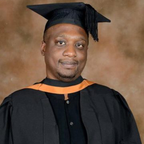
Pathways to Change and Collaborative Formulations: Enabling Violent Offenders to Understand Their Pathway to Prison in Partnership with an Expert by Experience (PID088)
Workshop Session
Pathways to Change and Collaborative Formulations: Enabling Violent Offenders to Understand Their Pathway to Prison in Partnership with an Expert by Experience (PID088)
4.30pm – 5pm EDT, 2 September 2024 ‐ 30 mins
Workshop Session
Speakers



Dr Bernie McEvoy
Senior Counselling Psychologist, Psychology Service, Irish Prison Service, Ireland
Do Severe Sanctions and Procedurally Just Treatment by Prison Staff Reduce In-Prison Misconduct and Recidivism? (PID011)
Workshop Session
Do Severe Sanctions and Procedurally Just Treatment by Prison Staff Reduce In-Prison Misconduct and Recidivism? (PID011)
4.30pm – 5pm EDT, 2 September 2024 ‐ 30 mins
Workshop Session
Speakers

Franziska Yasrebi-de Kom M.Sc.
PhD-candidate, Netherlands Institute for the Study of Crime and Law Enforcement (NSCR), The Netherlands
The Host’s Welcome Reception
Evening Event
The Host’s Welcome Reception
7pm – 9pm EDT, 2 September 2024 ‐ 2 hours
Evening Event
Copthorne Waterfront Hotel side lobby. Guests are invited to gather in the Veranda Room, Level 2, to
wait for transport. Transport will also be provided back to Grand Copthorne Waterfront Hotel at 21:15pm, 21:30pm nd 21:45pm after the Host’s Welcome Reception ends. Ushers will guide guests to the pick-up point from the Art Science Museum.

Keynote - On Assisted Desistance: IACFP Distinguished Scholar Lecture (PID219)
Plenary Session
Keynote - On Assisted Desistance: IACFP Distinguished Scholar Lecture (PID219)
9am – 10.30am EDT, 3 September 2024 ‐ 1 hour 30 mins
Plenary Session
Drawing chiefly on Australian data, I reflect on recent efforts to engage an assisted desistance framework in a custodial context. I discuss the rationale for including particular items on a co-designed instrument for “measuring” assisted desistance and how such an instrument might be used to improve prisons in the broadest sense or specific sections therein. I conclude with brief mention of the key challenges—but also the real benefits—associated with such work.Speakers

Mark Halsey
Matthew Flinders Professor of Criminology, Research Lead/ Member of the Centre for Social Impact, Flinders University, Australia
Coffee Break and Exhibition
Coffee Break
Coffee Break and Exhibition
10.30am – 11am EDT, 3 September 2024 ‐ 30 mins
Coffee Break
Work Ready, Release Ready: Supporting the Desistance Journey From Prison to Employment (PID176)
Workshop Session
Work Ready, Release Ready: Supporting the Desistance Journey From Prison to Employment (PID176)
11am – 11.30am EDT, 3 September 2024 ‐ 30 mins
Workshop Session
All phases involve personal support from a Workskil mentor, with whom participants can develop a trusting relationship. The first two phases focus on developing employment goals and a plan to meet educational and vocational needs as well as relevant prison work experience, where available. The final, community-based phase features tailored and highly flexible mentoring and support, ranging from vocational training, education, interview and job-search skills training to assistance with issues such as housing, parenting and mental health. Overall, WRRR participants that engaged in the post-release ‘Employment’ phase of the program demonstrated a lower 2-year rate of return to DCS custody for new charges and a higher employment rate than a comparative sample. When factoring in benefits to both participants and the broader community, WRRR generated a positive benefit-cost ratio of 2.76.
Speakers
Desistance and Morality: Accentuating Moral Psychology for Intervention in Minimizing Recidivism Among Juveniles (PID008)
Workshop Session
Desistance and Morality: Accentuating Moral Psychology for Intervention in Minimizing Recidivism Among Juveniles (PID008)
11am – 11.30am EDT, 3 September 2024 ‐ 30 mins
Workshop Session
Recidivism among juveniles, although copious interventions and rehabilitative programs implemented, has become a growing concern. Therefore, this research explores the intersection of moral psychology and juvenile recidivism. This study aims to understand the role of moral psychology, the study of morality’s influence on individual’s cognition, decision-making, and behavior, in the desistance process and its potential to minimize recidivism among juveniles in Malaysia. A study on youths aged 14 to 21 from multifarious levels of risk of offending was conducted to provide a comprehensive view on the issue. It reflects a distinctive relationship between key components in moral psychology; moral reasoning, moral emotion, and moral engagement; that provide significant influence on the capabilities and likelihood of desistance. The findings suggest that incorporating moral psychology into intervention strategies – from incorporating cognitive-behavioral approaches, reinforcing structured social learning components, addressing complex psychological needs and adverse experiences, providing opportunities and incentives, to monitoring and evaluating intervention effectiveness – significantly reduce the likelihood of offending. The study further reveals that understanding the moral psychological processes of juveniles can aid in the development of more effective intervention programs. This research contributes to the existing literature on juvenile justice by highlighting the importance of moral psychology in addressing recidivism. It provides a practical implication, suggesting for shifting in focus towards moral psychological aspects in designing intervention for juveniles. In conclusion, this study accentuates the need for further research to refine these intervention strategies and to explore other psychological factors that may influence desistance and recidivism among juveniles.Speakers

Sayed Mawismi Sayed Mohamad Mustar
Senior Associate Social Development Officer, Department of Social Welfare, Malaysia
Report of the Second World Congress for Community Volunteers Supporting Offender Reintegration (PID082)
Workshop Session
Report of the Second World Congress for Community Volunteers Supporting Offender Reintegration (PID082)
11am – 11.30am EDT, 3 September 2024 ‐ 30 mins
Workshop Session
Furthermore, this circumstance creates a new obstacles to recruit new candidates of volunteers due to un-well known. To resolve these challenges, promotion is one effective way to cultivate public understanding and disseminate their value to make them sustainably. In the light of developing effective promotion like Yellow Ribbon Project in Singapore, the volunteers will be taken some opportunity to share the practice and experience of other volunteers efficiently through the 2nd WCCV. In this presentation the speaker will provide the outline and share outcomes of the 2nd WCCV to the participants.
Speakers
Moe Hashimoto
Mitsuki Motohiro
Reducing the Harms of Incarceration (PID168)
Workshop Session
Reducing the Harms of Incarceration (PID168)
11am – 11.30am EDT, 3 September 2024 ‐ 30 mins
Workshop Session
i. Overcrowding in the Prison Population.
ii. Creating School of Crime Due to Overcrowding.
iii. Lack of Staff (Security & Rehabilitation Officers) .
iv. Lack Of Proper Accommodations.
v. Spreading diseases such as Covid 19, Tuberculosis, Hepatitis and Scabies.
vi. Impairment of Treatment for Substance Abuse
vii. Increased of recidivism.
Speakers
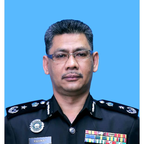
Innovative Approaches to Improving Access to Mental Health Support for People in Prison - Findings from the Introduction of a Mental Health Text Service for Prisoners (PID162)
Workshop Session
Innovative Approaches to Improving Access to Mental Health Support for People in Prison - Findings from the Introduction of a Mental Health Text Service for Prisoners (PID162)
11am – 11.30am EDT, 3 September 2024 ‐ 30 mins
Workshop Session
This presentation explores the implementation and findings of an innovative project introducing a confidential mental health and crisis support text service in two UK prisons. The project aims to improve access to mental health support for prisoners, addressing the significant concerns surrounding mental health in prison settings. The service, adapted from community provision, enables prisoners to seek immediate support for various issues. These have included relationship challenges, stress, loneliness and suicidal thoughts. Implementation involved developing a technical solution, obtaining necessary approvals, and collaborating with prisoners to ensure suitability. Initial outcomes indicate success, with over 1,000 prisoners accessing the service and 90% giving positive reviews indicating its helpfulness. Further longitudinal research evaluation and wider rollout are planned for 2024.Speakers

Natalie Parrett CPsychol, AFBPsS
Director of Psychological Services, Justice and Immigration, Serco, United Kingdom
Aging in the Prison Service: Experiences of Prison Governors in England and Wales (PID048)
Workshop Session
Aging in the Prison Service: Experiences of Prison Governors in England and Wales (PID048)
11am – 11.30am EDT, 3 September 2024 ‐ 30 mins
Workshop Session
Speakers

Professor Karen Harrison
Professor of Law and Penal Justice, University of Lincoln, England, United Kingdom
Lauren Smith
Associate Professor in Forensic Psychology, University of Lincoln, United Kingdom

Research & Development Network Meeting
Workshop Session
Research & Development Network Meeting
11am – 12.30pm EDT, 3 September 2024 ‐ 1 hour 30 mins
Workshop Session
Speakers


Dr Melvinder Singh Psy.D
Deputy Director, Senior Principal Psychologist, Singapore Prison Service, Singapore

Mark Halsey
Matthew Flinders Professor of Criminology, Research Lead/ Member of the Centre for Social Impact, Flinders University, Australia
The Professionalization of Work and Practical Training in Dutch Prisons (PID106)
Workshop Session
The Professionalization of Work and Practical Training in Dutch Prisons (PID106)
11.30am – 12pm EDT, 3 September 2024 ‐ 30 mins
Workshop Session
During this presentation, Marja ter Horst and Toon Molleman will present the workings and results of the national service organisation In-Made. They will show how the data allows for the development of job market profiles of prisoners and how this helps to uncover the job market position of prisoners. This includes information on what part of the Dutch prison population has a job before they enter prison, the types of jobs they have, their work attitudes, hindering factors (e.g. addiction, debts) and the practical training prisoners receive in prison.
Speakers

Marja ter Horst
Manager Service Organisation In-Mad, Dutch Custodial Institutions Agency, The Netherlands

Gaisce - The President's Award - A Transformative Model Toward the Personal Development and Self Enhancement of Young Adults in Custody in Ireland (PID095)
Workshop Session
Gaisce - The President's Award - A Transformative Model Toward the Personal Development and Self Enhancement of Young Adults in Custody in Ireland (PID095)
11.30am – 12pm EDT, 3 September 2024 ‐ 30 mins
Workshop Session
Gaisce The President’s Award is a Self-Development programme for young people between the ages of 14 and 26 which has been proven to enhance confidence and wellbeing through the participation in Skill, Community, Physical and Team based challenges with the support of a Mentor or President Award Leader (PAL). Gaisce operates across the entire educational and youth services in Ireland and includes the Irish Prison Service. The Gaisce Award Programme is also part of a global network of Award Programmes (The Duke of Edinburgh’s International Award) consisting of 130 countries Worldwide.
This workshop aims to share the values of incorporating an Award programme like Gaisce into custodial settings for young adults and the impact not only for prisoners who are eligible to engage in the programme but also on the staff and peer leaders that support them.
“I have seen and felt the positive outcome for prisoners doing the Gaisce Award. Anyone who takes part in this Award can not only succeed but can get back on the right track and that, to me, is a major step towards rehabilitation”. Gaisce PAL - Mountjoy Prison
Speakers

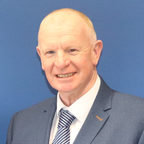
The Role of Voluntary Community-Based Organizations Within Reentry Courts and the Reentry Process (PID156)
Workshop Session
The Role of Voluntary Community-Based Organizations Within Reentry Courts and the Reentry Process (PID156)
11.30am – 12pm EDT, 3 September 2024 ‐ 30 mins
Workshop Session
This presentation will discuss an academic research study that examines a voluntary community-based organization (CBO) who provides wraparound, family-driven services to those affected by incarceration. The presentation will introduce the “Five Circles of Support”, an interactive, holistic approach created and implemented to assist incarcerated people, their children, and families. Particular attention will be paid to one of the five elements that focuses on cross-sector partnerships. More specifically, the presentation’s primary focus will be a government partnership the CBO has established with a federal reentry court to strengthen the likelihood of successful reentry and reintegration by facilitating a process referred to as “family reunification”. The study’s results and policy implications will be discussed.Speakers

Christina Bellasalma
PhD Candidate and Adjunct Instructor, Florida International University, United States
Rehabilitative Prison Environments: What’s Known About Them and How are They Being Operationalised? (PID089)
Workshop Session
Rehabilitative Prison Environments: What’s Known About Them and How are They Being Operationalised? (PID089)
11.30am – 12pm EDT, 3 September 2024 ‐ 30 mins
Workshop Session
The term ‘rehabilitative prison environment’ is increasingly used to capture some presumed essence of prisons’ positive potential. Yet this change is very recent. It was not until 2021 that the term gained some currency following the 14th United Nations Congress on Crime Prevention and Criminal Justice in Kyoto. There, a high-level event was themed on rehabilitative prison environments and the term appeared in connection with prisons in the official communique, the Kyoto Declaration. Now it is beginning to emerge in academic studies. Yet rehabilitative prison environments remain poorly defined, and the term is more often used simply as shorthand for improved conditions in prison aligned with the Nelson Mandela Rules. This paper draws on extant academic and grey literatures, combined with original research on national and state penal authorities’ use of this and allied concepts, such as rehabilitative culture. Triangulating theoretical, practical, and organisational forms, we suggest avenues for further thinking and exploration and reflect on how the custodial environment, long the Archilles heel of programming for rehabilitation, social reintegration, and desistance from offending, might again become a productive site of reform.Speakers
Isolation in Dutch Prisons; Perspectives of a Prison Director (PID128)
Workshop Session
Isolation in Dutch Prisons; Perspectives of a Prison Director (PID128)
11.30am – 12pm EDT, 3 September 2024 ‐ 30 mins
Workshop Session
In 2022, The Council for the Administration of Criminal Justice and Protection of Juveniles - an independent body established by law in the Netherlands – published a report urging the restraint in the use of isolation in Dutch prisons. In response, the Dutch Custodial Institutions Agency asked dr. Sharon Shalev to conduct research on the practices of isolation in Dutch prisons. Taking the recommendations from research and national advisory boards, the Dutch Custodial Institutions Agency has formulated a new vision on isolation, which incorporates the Mandela Rules. In this presentation, Harry Lefferts, prison director of the prison in Ter Apel (NL), will present his perspective on the new vision on isolation and shares his experiences of this new application of the practice of isolation of prisoners. The first experiences with this way of shaping time in isolation for prisoners are positive; the time spent in isolation now contributes to the process of stimulating a positive shift in a prisoner’s behaviour and mindset, with the ultimate goal of establishing a safe prison climate for prisoners and staff.Speakers


Meeting the Needs of Autistic Adults and Adults With Learning Disabilities in Prisons in the Midlands, UK (PID061)
Workshop Session
Meeting the Needs of Autistic Adults and Adults With Learning Disabilities in Prisons in the Midlands, UK (PID061)
11.30am – 12pm EDT, 3 September 2024 ‐ 30 mins
Workshop Session
The presentation will present the methodology and findings from our review which took place across 24 prisons in England with 191 staff and 93 people in prison. The presentation will provide an interactive opportunity for attendees to engage in case study discussion with the aim of identifying and sharing good practice, while also identifying opportunities for improvement in provisions and staff interactions. The presentation will provide an overview of the recommendations from our review and ask attendees to further consider the application of these within their own jurisdictions.
Speakers
Lauren Smith
Associate Professor in Forensic Psychology, University of Lincoln, United Kingdom

Bigger than McDonald's: Exploring the Award-Winning Traineeships and Apprenticeships Program in Prisons in Western Australia (PID169)
Workshop Session
Bigger than McDonald's: Exploring the Award-Winning Traineeships and Apprenticeships Program in Prisons in Western Australia (PID169)
12pm – 12.30pm EDT, 3 September 2024 ‐ 30 mins
Workshop Session
This presentation outlines the successful Western Australian model, considering how it was established and continues to grow and focuses on outcomes such as engagement, retention and completion rates, looking at subgroups such as female and Indigenous trainees. It also looks at significant wider outcomes such as earnings on post-release employment and social and economic inclusion indicators such as car and/or home ownership, telling the personal stories of current and past trainees.
The presentation also looks at recent research that identifies the reduced risk of reoffending of those who have engaged in a traineeship in prison, quantifying the savings made in reduced prison costs. It shows that having a robust traineeship/apprenticeship program contributes to community safety, is financially sustainable and provides real pathways to equity for incarcerated minorities. As such traineeships are a mighty tool with widespread benefits that should be seriously considered by prison administrators.
Speakers

Dr Fiona McGregor
External Partnerships Coordinator, Department of Justice, Western Australia, Australia
Relationship Between the Experience in Juvenile Training Schools and the Process of Desistance from Delinquency (PID052)
Workshop Session
Relationship Between the Experience in Juvenile Training Schools and the Process of Desistance from Delinquency (PID052)
12pm – 12.30pm EDT, 3 September 2024 ‐ 30 mins
Workshop Session
In recent years in Japan, while effectiveness research on reducing recidivism has shown what is effective in preventing recidivism, it has not been clear how correctional treatment affects desistance from crime after release. In this research, I examined how experiences in correctional institutions (juvenile training schools) are associated with the desistance from delinquency, based on overseas findings on the process of desistance from crime and offenders' self-transformation(e.g., Maruna (2001) and Giordano (2016)). Semi-structured interviews were conducted from May to July 2021 with four males aged 38 to 45 who had never been incarcerated in prison since their release from a juvenile training school, and the interview data were analyzed using a modified grounded theory approach. Analysis of interview data revealed that the process of desistance from delinquency can be divided into four stages: manifestation of delinquency, stay in juvenile training school, immediately after reintegration into society, and stabilization of a new self. It was suggested that how society and the people around the juvenile delinquent view the juvenile delinquent is decisive for their desistance from delinquency, and that to facilitate their desistance, they should make connections with the environment that can serve as hooks for change while they are still in juvenile training schools. Future challenges include conducting prospective and longitudinal studies, analyzing the process of desistance from the perspective of those around juvenile delinquents and others in society, and applying the findings to practice in correctional institutions.Speakers

Social Infrastructure in a Society of Captives: How it can Promote Positive Human Connections in Prisons and Support Rehabilitation and Desistance (PID057)
Workshop Session
Social Infrastructure in a Society of Captives: How it can Promote Positive Human Connections in Prisons and Support Rehabilitation and Desistance (PID057)
12pm – 12.30pm EDT, 3 September 2024 ‐ 30 mins
Workshop Session
Social infrastructure in prisons is an innovative concept that provides the foundation for allowing prisoners to practice different, future-oriented roles, which supports daily work aimed at rehabilitation and desistance. It can be thought of as both the physical spaces that promotes more normalised interactions, and as the connective tissue that is made up of the social connections and interactions between everyone within the institution. It focuses on the places, programs, and activities within the prison environment where activities and temporary roles can provide opportunities for inmates to move away from the identity of ‘prisoner’ or ‘criminal’ towards one which lays for the foundation for desistance post-release. It can do this by providing a platform that allows prisoners to practice responsibility and normalised human interaction. The concept is underpinned by the normalisation principle that is applied across Nordic countries. The question whether it can be applied, or is already used, in ‘island of exception’ within otherwise more punitive correctional approaches, for example in Australia and other Anglophone countries, will be explored in this presentation.Speakers

Empowering Officers: Dynamic Security Training for Safer, Rehabilitative Prisons in Estonia (PID063)
Workshop Session
Empowering Officers: Dynamic Security Training for Safer, Rehabilitative Prisons in Estonia (PID063)
12pm – 12.30pm EDT, 3 September 2024 ‐ 30 mins
Workshop Session
How can correctional officers be empowered to create safer, more rehabilitative prisons, especially in linguistically diverse contexts like Estonia? Through the implementation of dynamic security strategies, the Prison Service College of the Estonian Academy of Security Sciences introduces a comprehensive training program focusing on professional, humane, and ethical interactions with inmates. These curricula integrate theoretical knowledge with practical sessions, facilitated by experts from various fields and incorporating foreign language training. By embracing dynamic security principles, officers are equipped to foster a secure environment while supporting inmates, including foreigners, in their rehabilitation journey. Though challenges such as mindset shifts and language proficiency exist, this approach significantly contributes to inmates' transition towards law-abiding citizenship.Speakers


A New Forensic Mental Health Facility to Support Rehabilitation and Recovery (PID203)
Workshop Session
A New Forensic Mental Health Facility to Support Rehabilitation and Recovery (PID203)
12pm – 12.30pm EDT, 3 September 2024 ‐ 30 mins
Workshop Session
Consumer representatives, comprising current and former consumers (patients) and their carers, played a vital and expansive role in this co-design process, as did extensive collaboration with the Wurundjeri Land Council, representing the Traditional Owners of the land.
The expansion is being constructed in a fully operating facility, bringing complexity in functional planning, staging, separation of secure zones, services connectivity, and ensuring sitewide healthcare delivery is uninterrupted.
Speakers

Monitoring the Health Care Provided to People in Custody (PID155)
Workshop Session
Monitoring the Health Care Provided to People in Custody (PID155)
12pm – 12.30pm EDT, 3 September 2024 ‐ 30 mins
Workshop Session
Prison oversight bodies field an extraordinary number of complaints from incarcerated people about their problems with access to health care and the quality of the care that is delivered, and poor medical care also contributes to deaths in custody and worsened health outcomes for people who have been incarcerated. This session, featuring two of the world’s leading experts on correctional health care, specifically addresses how these issues can and should be monitored by external observers. Dr. Marie Brasholt of DIGNITY-Danish Institute Against Torture will highlight her new manual on monitoring health care in detention settings, and Dr. Marc Stern, a former prison medical director and federal court-appointed monitor, will address how courts in the United States seek to assess and ensure the constitutionality of prison health care systems. Moderated by prison oversight expert Michele Deitch of the Prison and Jail Innovation Lab at the University of Texas, the session is designed to give attendees practical tools they can apply in their oversight roles to assess whether incarcerated people are receiving the medical care they need and whether there is a seamless delivery of health care from incarceration through release.Speakers

Prof. Michele Deitch
Director, Prison and Jail Innovation Lab at the University of Texas at Austin, USA

Marc Stern
Federal Court Monitor/ Consultant, University of Washington School of Public Health

Lunch and Exhibition
Lunch
Lunch and Exhibition
12.30pm – 1.30pm EDT, 3 September 2024 ‐ 1 hour
Lunch
Moving the Monolith: From Crisis Management to Purposeful Change (PID031)
Plenary Session
Moving the Monolith: From Crisis Management to Purposeful Change (PID031)
1.30pm – 3pm EDT, 3 September 2024 ‐ 1 hour 30 mins
Plenary Session
As our sector continues to evolve, how do we ensure the execution of the change will realise the vision, be sustainable and enduring. Change is not simply one or even a list of new initiatives. Change involves forethought and clearly establishing the conditions for success. Correctional services need to find the urgency and motivation for change from within while operating at the nexus of political, operational, and financial realities, always keeping the health, safety, and wellbeing of our staff and those in our custody centred within our efforts. Panelists will discuss failures and successes in achieving real change. The strategic perspective will be grounded by practical, illustrative views that brings into focus the relationship between initiatives and the value proposition they purport to bring.Speakers

Howard Sapers
Visiting Professor, University of Ottawa, Former Correctional Investigator of Canada, Canada

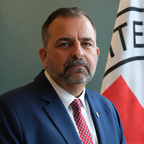
Terry Hackett
Head of Unit, Persons Deprived of Liberty, International Committee of the Red Cross (ICRC), Switzerland

Anne McLellan
Former Deputy Prime Minister of Canada, Former Minister of Public Safety and Emergency Preparedness

Coffee Break and Exhibition
Coffee Break
Coffee Break and Exhibition
3pm – 3.30pm EDT, 3 September 2024 ‐ 30 mins
Coffee Break
Re-entry Programs for Women and Children (PID218)
Workshop Session
Re-entry Programs for Women and Children (PID218)
3.30pm – 4.15pm EDT, 3 September 2024 ‐ 45 mins
Workshop Session
Reentry services and programs vary widely within the world of professional corrections. Several key factors such as funding, culture, political climate, and the availability of resources can impact this critical element of transition from criminal justice involvement to community. Research has shown that reentry planning, services and community-based programs have a significant and lasting impact on desistence. Some of the more common reentry services provided include job training and placement programs, substance abuse treatment, mental health services, housing assistance, and educational opportunities. Despite advancements and efforts to improve reentry services in recent years, there are still significant challenges and barriers that individuals face when transitioning back into society after incarceration.
This workshop will focus on the incredible success of the Women and Children’s Program of Alvis. Under the leadership of Denise Robinson who brought this program to life some 10 years ago. Alvis and the community have created a national model that is providing amazing outcomes while breaking the cycle of generational trauma and building sustainable, transformational life skills.
The workshop will focus on the patterns of generational trauma and how the Alvis program has constructed an extremely successful model of parenting skill education, clinical care and prevention, and a family focus that provides the tools needed by both parent and child to turn lives around and move together toward a life of promise. Areas of discussion will include:
- Programme development
- Important barriers to overcome
- Sustainability
- Importance of program data and evaluation
(This workshop will be a combination of discussion and multi-media to include videos, interviews and data presentation)
Speakers

Robert L Green
Secretary, State of Maryland Department of Public Safety and Correctional Services, USA

Denise M. Robinson
President and CEO, Alvis Inc, President, American Correctional Association (ACA), United States
Enlivening the Recommendations from the Health in Detention Conference led by the International Committee of the Red Cross in Geneva in 2022 (PID214)
Workshop Session
Enlivening the Recommendations from the Health in Detention Conference led by the International Committee of the Red Cross in Geneva in 2022 (PID214)
3.30pm – 4.15pm EDT, 3 September 2024 ‐ 45 mins
Workshop Session
This is a call to action, and you will gain:
1. Deeper understanding of the United Nations Standard Minimum Rules for the Treatment of Prisoners (the Nelson Mandela Rules).
2. An exploration into how international standards can improve conditions of confinement, rehabilitation programs, and reintegration strategies in your country.
3. Learning from leading experts on implementing best practices in your own correctional setting.
4. Networking and the sharing of insights with colleagues from across the justice system
Don't miss this opportunity to shape the future of corrections in your community! Come and be a part of the change in your country.
Speakers

Dieudonné Koyenga
Prison System Adviser, International Committee of the Red Cross, Côte d'Ivoire

Wendy Hoey
Chief Executive, Justice Health and Forensic Mental Health Network NSW, Australia
A Tale of Two Cities: Legacies and Healing the Harm (PID105)
Workshop Session
A Tale of Two Cities: Legacies and Healing the Harm (PID105)
3.30pm – 4.15pm EDT, 3 September 2024 ‐ 45 mins
Workshop Session
Like the two cities in Dickens’ novel, the context for each is revealing of character and sets the arc of the narrative. The effect of the trauma of confinement is ever present, haunting the protagonist and those who love him. Our two new buildings are partly shaped by memory and context and must consider what has gone before in order to propose a new narrative, one that points to healing and restoration, both for the people the system serves, as well as the communities where the presence of a jail building defines a neighborhood.
The similarities of the projects in size (850/1040 beds), context (site of demolished former jail), density (busy urban locations) offers a neutral point of departure for their differences. Without judgement, these differences will be explored, and their potential to affect desistance considered. Their parallel and simultaneous development offers lessons in delivery methodologies, culture, and community that will be influential across the US.
Speakers

Faith-Based Futures: Shaping Hearts and Minds that Extend Beyond Prison Walls (PID173)
Workshop Session
Faith-Based Futures: Shaping Hearts and Minds that Extend Beyond Prison Walls (PID173)
3.30pm – 4.15pm EDT, 3 September 2024 ‐ 45 mins
Workshop Session
Join Joe Pryor, President/CEO of Crossroads Prison Ministries, for his presentation on "Faith-Based Futures: Shaping hearts and minds that extend beyond prison walls". Drawing on his extensive experience as a prison chaplain, warden, and reentry consultant, Joe explores the transformative impact of religious and general programming in correctional facilities. Discover how these programs cater to inmates' educational, vocational, and spiritual needs, fostering personal development and reducing recidivism rates. Through compelling data and personal narratives, Joe showcases the effectiveness of faith-based initiatives in motivating change and providing a foundation for successful reintegration. Learn about the challenges and strategies in implementing comprehensive rehabilitation programs and gain insights into optimizing program delivery. Don't miss this opportunity to be inspired by Joe's commitment to inmate rehabilitation and reintegration, and to explore collaborative approaches for creating safer, more compassionate communities.Speakers

Can Independent Oversight Impact Successful Re-entry? (PID165)
Workshop Session
Can Independent Oversight Impact Successful Re-entry? (PID165)
3.30pm – 4.15pm EDT, 3 September 2024 ‐ 45 mins
Workshop Session
This roundtable discussion with three respected leaders in the correctional oversight field—Michele Deitch and Alycia Welch of the Prison and Jail Innovation Lab (PJIL), which studies prison oversight bodies across the US, and Ivan Zinger, head of Canada’s Office of the Correctional Investigator—explores the untapped potential of oversight organizations to both assess and have an impact on correctional agencies’ re-entry efforts. Prison oversight bodies are uniquely equipped to assess whether incarcerated people are being appropriately prepared to re-enter our communities and desist from crime. Panelists will address how oversight bodies can enhance their efforts to assess whether re-entry preparation is working. They will also reflect on whether oversight bodies might have an actual impact on successful reintegration and desistance, and whether they should be held accountable for having such an impact, given the importance of successful re-entry from a public safety perspective. This debate raises fundamental questions about what metrics oversight bodies should be reporting about the impact they have through their work, whether on re-entry outcomes or on other indicators of the quality of life behind bars.Speakers

Prof. Michele Deitch
Director, Prison and Jail Innovation Lab at the University of Texas at Austin, USA

Alycia Welch
Associate Director, Prison and Jail Innovation Lab, Lyndon B. Johnson School of Public Affairs, Univ. of Texas at Austin, USA

Dr. Ivan Zinger
Correctional Investigator, Canada's Office of the Correctional Investigator, Canada
Reality, Resocialization, And Recidivism in Colombia: The Unseen Human Rights Situation of Life in Prison (PID222)
Workshop Session
Reality, Resocialization, And Recidivism in Colombia: The Unseen Human Rights Situation of Life in Prison (PID222)
3.30pm – 5pm EDT, 3 September 2024 ‐ 1 hour 30 mins
Workshop Session
Speakers

Jorge Enrique Ibáñez Najar
Constitutional Court Magistrate , Special Chamber for Monitoring the State of Unconstitutional Prison and Jail Conditions
Staff Training and Development Network
Workshop Session
Staff Training and Development Network
3.30pm – 5pm EDT, 3 September 2024 ‐ 1 hour 30 mins
Workshop Session
- To maintain ICPA as an innovative, learning organization, promoting and disseminating good practice through the recruiting, vetting, training of staff and the development and implementation of good personnel policies;
- To enhance co-operation in development of curriculum, lesson plans and training techniques between regions, countries, public, private and voluntary sectors involved in corrections, detention, community services and prisons;
- To develop and promote policies and standards for the training of individuals concerned with the operation of professional and humane corrections, detention, community services and prisons;
- To influence governments, policy makers, correction administrators and managers to adopt good personnel policies and to constantly update and improve training for staff and others associated with the operation of safe, humane and effective corrections, detention, and community services and prisons.
Speakers

Douglas Dretke
Director of the Office of Comparative and International Education and Leadership, Sam Houston State University, United States
Towards Desistance: The Experiences of Namibian Ex-Offenders of Factors That Have Shaped Their Journeys (PID213)
Workshop Session
Towards Desistance: The Experiences of Namibian Ex-Offenders of Factors That Have Shaped Their Journeys (PID213)
4.15pm – 5pm EDT, 3 September 2024 ‐ 45 mins
Workshop Session
Desistance from criminal behaviour is a nuanced process influenced by a range of internal and external factors. This presentation explores the impact of societal factors in Namibia on the desistance process, drawing from the experiences of 15 males who have refrained from criminal behaviour for at least five years post-release from custody. The narratives of these individuals unveil a consistent trend of nurturing social networks and widespread community acceptance upon their return to society. Consequently, the presentation underscores the importance of familial, communal, and civic relationships in facilitating the desistance journey, while also emphasizing the critical role of enabling environments in this process. Furthermore, it highlights the necessity to address obstacles that hinder offenders from achieving desistance, such as stigma and discrimination, limited access to employment and education, inadequate support services, lack of re-entry programmes, certain community supervision practices, and legal and regulatory barriers.Speakers

Mariana Martin
Deputy Commissioner-General: Rehabilitation and Reintegration, Namibian Correctional Service, Namibia

Enhancing Correctional Healthcare: Leveraging the 340B Program for Inmate Well-being and Desistance (PID023)
Workshop Session
Enhancing Correctional Healthcare: Leveraging the 340B Program for Inmate Well-being and Desistance (PID023)
4.15pm – 5pm EDT, 3 September 2024 ‐ 45 mins
Workshop Session
We will examine the 340B program's framework, illustrating how similar initiatives can be adapted to correctional healthcare systems worldwide, thereby promoting health equity and improving patient outcomes among incarcerated populations. The presentation highlights strategic approaches to implementing such programs, including navigating policy challenges, fostering cross-sector partnerships, and leveraging technology for operational efficiency.
Drawing on evidence and case studies, we demonstrate the positive impacts of enhanced healthcare access on desistance, showcasing reduced recidivism rates and improved reintegration success. The presentation addresses the multifaceted challenges of program implementation within the unique context of correctional institutions and outlines a comprehensive evaluation framework for assessing effectiveness.
Concluding with a call to action, we urge corrections professionals and policymakers to consider the critical role of healthcare in rehabilitation efforts. By prioritizing accessible healthcare, correctional systems can move beyond traditional recidivism metrics, supporting a more humane and effective approach to corrections that aligns with the broader goals of the ICPA 2024 conference theme.
Speakers


What Contribution do Correctional Officer Trade Unions Make to Enabling Desistance, A Comparative Analysis of Canada and Scotland (PID002)
Workshop Session
What Contribution do Correctional Officer Trade Unions Make to Enabling Desistance, A Comparative Analysis of Canada and Scotland (PID002)
4.15pm – 5pm EDT, 3 September 2024 ‐ 45 mins
Workshop Session
While there is a consistent decline in levels of trade union membership Internationally, prison officer trade unions have retained relatively high levels of membership, sometimes at levels of over 80% of uniformed prison staff. Despite the high levels of unionisation within prison jurisdictions, the significance and meaning of trade union membership remains under-analysed within both the criminology and industrial relations literature. This study seeks to redress this omission, through analysing data collected through an online survey of all members of the Prison Officer Association Scotland (POAS), conducted in 2021 and and Union of Canadian Correctional Officers Syndicat des Agents Correctionnels du Canada Confédération des Syndicats Nationaux (CSN) conducted in 2022. Our analysis also provides new insights into both the reality and perception of prisons as workplaces permeated by ‘risk’. Ultimately, we argue that membership of a trade union is a critical and largely previously overlooked influence within the criminal justice system, particularly where high levels of union density are evident.Speakers


Professor Rosemary Ricciardelli
Professor and Research Chair: Safety, Security, and Wellness, Memorial University of Newfoundland, Canada
Redefining Rehabilitation: Success Factors for Lasting Change (PID174)
Workshop Session
Redefining Rehabilitation: Success Factors for Lasting Change (PID174)
4.15pm – 5pm EDT, 3 September 2024 ‐ 45 mins
Workshop Session
Join us to hear Matthew Poh's compelling journey from a life overshadowed by addiction and incarceration to becoming the founder of "The Caffeine Experience", a groundbreaking social enterprise in Singapore. Matthew's transformative path began with religious programming received during his incarceration, which ignited a newfound hope and purpose in his life. This crucial intervention spurred him to create a business model that not only offers quality café services but also plays a pivotal role in rehabilitating and reintegrating ex-offenders into society. Through "The Caffeine Experience", Matthew has successfully provided employment, mentorship, and personal development opportunities to ex offenders, proving the profound impact of support, faith, and second chances. This session promises to inspire and enlighten attendees on the power of innovative rehabilitation strategies and the vital role of spiritual renewal in fostering societal change. Matthew's journey illustrates the incredible potential for transformation and redemption, making this presentation essential for anyone interested in lasting transformation and the importance of religious programming.Speakers

Adapting Standards of Best Practice to Local Contexts Through Prison Oversight (PID086)
Workshop Session
Adapting Standards of Best Practice to Local Contexts Through Prison Oversight (PID086)
4.15pm – 5pm EDT, 3 September 2024 ‐ 45 mins
Workshop Session
This panel delves into the crucial task of adapting international standards of best practice to diverse local contexts. Three esteemed panelists will draw upon their diverse expertise to provide practical examples, innovative approaches, and recommendations for adapting standards of best practice to local prison contexts through oversight mechanisms. Questions to be explored include: How can oversight bodies reconcile aspirational international standards with the complex realities of local culture and practices within prison systems? Why are minimum standards sometimes insufficient, and how can oversight bodies advocate for higher benchmarks to ensure effective rehabilitation and humane treatment? What strategies can oversight bodies employ to enhance their internal capacity for incorporating and implementing best practices, considering resource constraints and institutional resistance?Speakers

Dr. Ivan Zinger
Correctional Investigator, Canada's Office of the Correctional Investigator, Canada

Andreea Lachsz
Quentin Bryce Law Doctoral Scholar and Teaching Fellow, University of Technology, Sydney, Australia
Rafael Barreto Souza
Crime Prevention and Criminal Justice Officer, United Nations Office on Drugs and Crime, Philippines
Opening Introduction
Plenary Session
Opening Introduction
9am – 9.10am EDT, 4 September 2024 ‐ 10 mins
Plenary Session
Opening Address
Plenary Session
Opening Address
9.10am – 9.25am EDT, 4 September 2024 ‐ 15 mins
Plenary Session
Speakers
Yellow Ribbon Community Day Launch
Plenary Session
Yellow Ribbon Community Day Launch
9.25am – 9.40am EDT, 4 September 2024 ‐ 15 mins
Plenary Session
Plenary Presentation by Keynote Speaker, Prof Fergus McNeill: "Finding a Way Home: Desistance, Rehabilitation and Belonging" (PID223)
Plenary Session
Plenary Presentation by Keynote Speaker, Prof Fergus McNeill: "Finding a Way Home: Desistance, Rehabilitation and Belonging" (PID223)
9.40am – 10.30am EDT, 4 September 2024 ‐ 50 mins
Plenary Session
Speakers

Fergus McNeill
Professor of Criminology and Social Work, University of Glasgow, United Kingdom
Break and Exhibition
Coffee Break
Break and Exhibition
10.30am – 11am EDT, 4 September 2024 ‐ 30 mins
Coffee Break
Promoting Desistance, Beyond Recidivism: Singapore Correctional Model (PID224)
Plenary Session
Promoting Desistance, Beyond Recidivism: Singapore Correctional Model (PID224)
11am – 11.30am EDT, 4 September 2024 ‐ 30 mins
Plenary Session
Speakers

Caroline Lim
Director (Rehabilitation & Reintegration Division), Singapore Prison Service (SPS)
Unlocking the Second Prison: From Vision to Reality, YRSG (YRP) (PID042)
Workshop Session
Unlocking the Second Prison: From Vision to Reality, YRSG (YRP) (PID042)
11.30am – 12pm EDT, 4 September 2024 ‐ 30 mins
Workshop Session
The YRP was born in 2004, drawing inspiration from the song “Tie a Yellow Ribbon Round the Old Oak Tree”. The start of YRP was challenging as it was an abstract concept in the beginning and we had to overcome biases towards ex-offenders.
With a clear vision, sustained outreach and public engagement over two decades, we have been able to gain public mindshare of what the Yellow Ribbon stands for.
The YRP’s strengths lay in galvanising the people, private and public sectors to create awareness of giving second chances to ex-offenders, champion acceptance of ex-offenders, and inspire community action to support the rehabilitation and reintegration of ex-offenders. This whole-of-community approach increases public trust and encourages community support and adoption of the YRP, with the ultimate aim of lowering the recidivism rate.
The many successful YRP signature initiatives continue to drive YRP’s momentum as we celebrate its 20yr landmark this year; art exhibitions, song writing showcases, concerts, culinary competitions, poetry writing and story-telling competitions, mass walk and run. Communications efforts using a multi-platform approach also complemented community outreach efforts, thus maximising YRP’s reach and engagement, leading to a high level of awareness amongst the community.
We hope that this universal theme of second chances will transcend borders, with countries beyond Singapore also leveraging YRP to weave an ever-expanding ribbon of hope and opportunities for ex-offenders and their families.
Speakers

Elvin Chew
Family-Focused Practices of Coloane Prison - Correctional Services Bureau, Macao, China (PID204)
Workshop Session
Family-Focused Practices of Coloane Prison - Correctional Services Bureau, Macao, China (PID204)
11.30am – 12pm EDT, 4 September 2024 ‐ 30 mins
Workshop Session
Family is the oldest and most common social phenomenon that has existed since the formation of human society. Not only is family very important to individuals, but it also forms the basis of society. The unique status of family is irreplaceable. An inmate’s imprisonment has an enormous impact on his or her family, transforming the once-whole family into a “pseudo-single-parent family”.
Therefore, this presentation will explore how an inmate’s admission to prison will affect his or her family and share Coloane Prison’s practices in recent years that aim to promote inmates’ family relationships. The future challenges for the Prison’s family-focused practices will also be analysed and strategies will be put forward to address the challenges.
Speakers

Ka Wai Ng
Senior Specialist, Social Assistance and Psychological Support Team, Correctional Services Bureau, Macao, China
Animal-Assisted Activities Provide Prosocial Support and Enhance Reintegration of Ex-Inmates, Human-animal bond In Ministry (HIM) (PID036)
Workshop Session
Animal-Assisted Activities Provide Prosocial Support and Enhance Reintegration of Ex-Inmates, Human-animal bond In Ministry (HIM) (PID036)
11.30am – 12pm EDT, 4 September 2024 ‐ 30 mins
Workshop Session
Prosocial support helps ex-inmates assimilate into the community. However, in the immediate post-release period, when the stress and challenges of reintegration are the greatest, ex-inmates often face difficulties securing adequate support.
They have not yet had time to prove themselves, win others’ trust and establish supportive relationships that will help them navigate their challenges after release. Animal-assisted activities can help to fill this potential gap, as animals provide unconditional, non-judgmental, helping to foster acceptance and attachment while ex-inmates work on establishing other avenues of support. This presentation shows how Human-animal bond In Ministry (HIM), a social enterprise in Singapore, has successfully incorporated animal-assisted activities in combination with other services to provide prosocial support and enhance the reintegration of ex-inmates.
Speakers

Singapore’s Approach to Enhance Long Term Career Development and Mobility of Offenders, YRSG (PID084)
Workshop Session
Singapore’s Approach to Enhance Long Term Career Development and Mobility of Offenders, YRSG (PID084)
11.30am – 12pm EDT, 4 September 2024 ‐ 30 mins
Workshop Session
This presentation will be an extension of the presentation conducted by YRSG at 2023’s ICPA Conference. It will cover Yellow Ribbon Singapore (YRSG)’s continued efforts in providing skills training and education for inmates, with the aim to enhance inmate’s employability potential, promote lifelong learning, skills deepening, and long-term career development. These initiatives include bringing forward in-depth career conversations to empower inmates to proactively take charge of their careers and understand their own career journey, offering training that is aligned with the broader national framework, as well as expanding opportunities for inmates to experience longer term growth and development in selected industries.
Speakers


The Hope Project: Empowering Desistance Through Artisanal Rehabilitation, Bureau of Jail Management and Penology (BJMP) Philippines (PID154)
Workshop Session
The Hope Project: Empowering Desistance Through Artisanal Rehabilitation, Bureau of Jail Management and Penology (BJMP) Philippines (PID154)
11.30am – 12pm EDT, 4 September 2024 ‐ 30 mins
Workshop Session
Join us as we delve into the transformative power of The Hope Project, led by the visionary JCINSP Aris Williamere A Villaester, MM, Jail Warden of Lipa City Jail Male Dormitory. This pioneering initiative aims to facilitate the reintegration of Persons Deprived of Liberty (PDL) into society, presenting a unique approach that goes beyond conventional methods.
Through the creation and sale of artisanal products crafted by PDL themselves, The Hope Project provides not only financial assistance but also a platform for artistic expression and skill development. Join us as we explore how this innovative program empowers PDL to take an active role in their rehabilitation journey, fostering a sense of dignity and purpose along the way.
Discover how strategic partnerships, community engagement, and ongoing innovation are overcoming challenges to ensure the sustainability and long-term impact of The Hope Project. Be inspired by success stories and testimonials showcasing the tangible benefits experienced by PDL beneficiaries, and learn how you can contribute to breaking the cycle of recidivism and promoting societal reintegration.
Join us in unlocking the potential of The Hope Project as we work towards a future where every individual, regardless of past mistakes, has the opportunity for redemption and a second chance at life.
Speakers

Aris Williamere Villaester
Jail Officer/ City Jail Warden, Bureau of Jail Management and Penology (BJMP), Philippines
Being Different: Incorporating Emotive-Cognitive Relational Approach for Desistance of Neurodivergent Juveniles, Department of Social Welfare, Malaysia (PID006)
Workshop Session
Being Different: Incorporating Emotive-Cognitive Relational Approach for Desistance of Neurodivergent Juveniles, Department of Social Welfare, Malaysia (PID006)
11.30am – 12pm EDT, 4 September 2024 ‐ 30 mins
Workshop Session
Neurodivergence is a concept that is often overlooked when it comes to the juvenile justice system, though the prevalence seems to support the need for some justifiable intervention that is central to this. With the idea garnering momentous understanding and focus, there is an exigency for neurodivergence to be insinuated in the juvenile justice context for effective rehabilitation and desistance.
To develop a justifiable and inclusive approach to this, this research has proposed the Emotive-Cognitive Relational Approach (ECRA) to be incorporated in the program to attend to these needs. It recognizes that emotions and cognition are intertwined and play a significant role in shaping behaviours alongside facilitating positive changes.
A study conducted onto youths aged 14 to 21 from mild to moderate symptom with a series of interventions implemented in juvenile rehabilitation programs, based on ECRA, this approach implemented; from initial assessments, information and education provision, planning development, intervention implementation, positive and supportive fostering, ongoing monitoring and feedback, to transition and reintegration facilitation; were tailored to the unique needs of neurodivergent juveniles. The findings show a significant improvement in the desistance process, with participants showing enhanced emotional regulation, cognitive flexibility, and interpersonal skills.
Conclusively, “being different” is not about labelling or stigmatizing neurodivergent juveniles, but recognizing their uniqueness, understanding their needs, and harnessing their potential. This research calls for further research to refine this approach and explore its potential in different contexts where it shifts the focus from punishment to rehabilitation, from deficit to strength, and from exclusion to inclusion.
Speakers

Sayed Mawismi Sayed Mohamad Mustar
Senior Associate Social Development Officer, Department of Social Welfare, Malaysia
Transmission of Intergenerational Trauma and Challenges Faced by Caregivers, SPS (PCRD) & KKH (PID188)
Workshop Session
Transmission of Intergenerational Trauma and Challenges Faced by Caregivers, SPS (PCRD) & KKH (PID188)
11.30am – 12pm EDT, 4 September 2024 ‐ 30 mins
Workshop Session
Gender-responsive research reveal fundamental differences between female and male offenders. Previous local research also showed that compared with two drug-abusing parents, having a drug-abusing mother increases the risk of child offending by 4.1 times (Loh, Ch’ng, & Cheng, 2020).
With this backdrop in mind, this is a needs analysis study on the health, social and psychological needs of Incarcerated Mothers (IM), their children, and caregivers in Singapore. This is a mixed method study involving three non-randomised groups of participants: (A) IM who have young children aged 0-6 years old, (B) the young children (aged 0-6 years old) of IM, and (C) the corresponding community caregivers of said children.
The key findings include the high prevalence rate of Adverse Childhood Experiences (ACEs) in IM as well as a significant correlation between number of ACEs experienced by the mother and child, children of IM are at risk of social-emotional delay, and caregivers experienced several challenges relating to emotional struggles, strained relationships between caregiver and IM, as well as a lack of caregiver resources and support needs. Community initiatives and family-based interventions, particularly in trauma-informed practice and parent-child relationship are recommended for greater outreach and engagement of these families.
Speakers

Fann Jiang
Assistant Director / Lead Psychologist, Singapore Prison Service, Ministry of Home Affairs Singapore


Christine Chua
Principal Medical Social Worker, KK Women's and Children's Hospital Singapore
Nurturing Staff through Organisational Culture and Promoting Resilience to Support Offenders, SPS (SPD & PCRD) (PID194)
Workshop Session
Nurturing Staff through Organisational Culture and Promoting Resilience to Support Offenders, SPS (SPD & PCRD) (PID194)
11.30am – 12pm EDT, 4 September 2024 ‐ 30 mins
Workshop Session
Captains Of Lives (COL) are the heart of our organisation and the centre of the ripple of change. In Singapore Prison Service (SPS), we build and sustain a strong organisation culture that is driven by purpose and clear expectations as well as provide mental wellbeing support for our staff to function optimally at work and at home.
The SPS Desired Culture was formulated in 2022 to set clear directions and empower every COL to deliver our Mission and Vision. The Desired Culture consists of 2 main culture statements ‘COLs who Dare’ and ‘COLs who Care’ which are supplemented with 9 behavioural statements. Dare is about upskilling and pushing boundaries and Care is about building positive and collaborative relationships with each other, beneficiaries and stakeholders.
In addition, SPS adopts systemic level interventions and departmental wide initiatives and multi-layer involvements by COLs to raise awareness and create a positive culture on mental wellness. The WeWorkWell Framework was launched in August 2021 to support and enhance staff's mental health and wellbeing. It focuses on environmental and systemic level issues to provide holistic and structured approach in planning mental health initiatives.
Speakers
Dhevani Ramachandran
Assistant Director, Organisational Planning and Development, Singapore Prison Service

Rashida Mohamed Zain
Senior Assistant Director, Principal Psychologist, Singapore Prison Service, Singapore
The Neu Empowerment Model: Empowering a “Neu” Generation of individuals to break free from the intergenerational cycle (PID043)
Workshop Session
The Neu Empowerment Model: Empowering a “Neu” Generation of individuals to break free from the intergenerational cycle (PID043)
12pm – 12.30pm EDT, 4 September 2024 ‐ 30 mins
Workshop Session
NeuGen Fund (“NeuGen”) is an approved IPC charity that primarily supports children and families of reformed offenders. With the main aim of preventing intergenerational offending, we engage and empower these children through various initiatives under the Neu Empowerment Model, focusing on initiatives in areas of education, mental wellbeing/voice, holistic growth, and family.NGF's Neu Empowerment Model addresses the challenges of intergenerational offending by providing comprehensive support to families affected by incarceration. Through programs like After School Activity (ASA), Youth Engagement Platform, and Mother Support Group (MSG), NGF fosters holistic development and resilience in children and adolescents. Additionally, NGF's case management, facilitated by Family Engagement Specialists (FES) and volunteer Family Befrienders (FBs), ensures personalized support and long-term engagement. By combining targeted interventions with ongoing assistance, NGF empowers families to overcome the impacts of incarceration and build brighter futures, supported by research and real-life success stories.
Speakers


Throughcare Journey for Inmates and their Families, SPS (RRD) & Salvation Army (PID182)
Workshop Session
Throughcare Journey for Inmates and their Families, SPS (RRD) & Salvation Army (PID182)
12pm – 12.30pm EDT, 4 September 2024 ‐ 30 mins
Workshop Session
Singapore Prison Service recognises the vital role of involving and supporting families in the rehabilitation of offenders, desistance and reducing the risk of inter-generational offending.
Singapore Prison Service collaborates with other government agencies and community partners to support inmates’ families and children, through various programmes, services, and initiatives like a coordinated referral process and strengthening the community network.
This presentation showcases initiatives undertaken by Singapore Prison Service and its close collaboration with one of the community partners, The Salvation Army, to involve and support the inmates' families, especially children, in the rehabilitation and reintegration journey, in a deliberate and sustainable manner.
Speakers
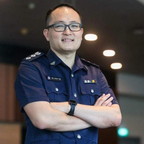
Choon Yong Ong
Senior Assistant Director, Community Partnership & Family Policy, Singapore Prison Service, Singapore

The Theatre Arts Programme (TAP) in Changi Prison: Nurturing Rehabilitation Through Drama-Based Learning (PID158)
Workshop Session
The Theatre Arts Programme (TAP) in Changi Prison: Nurturing Rehabilitation Through Drama-Based Learning (PID158)
12pm – 12.30pm EDT, 4 September 2024 ‐ 30 mins
Workshop Session
The Theatre Arts Programme (TAP) initiated by the Singapore Prison Service (SPS) in 2011, represents a groundbreaking initiative aimed at fostering rehabilitation and lifelong learning among incarcerated individuals. Designed, developed and implemented by Peggy Ferroa, TAP’s roots trace back to pilot programmes initiated as early as 2006.
The mission was to create pedagogically sound approaches to encourage lifelong learning for participants from multiple ethnicities and ages. Specifically targeting inmates with limited or no formal education, TAP employs creative modalities such as drama, percussion, movement, and basic stage management. These serve as vehicles to ignite interest in learning, enhance written and spoken English, and instil valuable work ethics.
The programme’s theoretical foundations draw from Bandura’s Social Learning Theory (1977) emphasising observational learning and self-efficacy, and Kolb’s Experiential Learning Cycle (1984), encouraging active participation and reflection. TAP’s assessments are performance-based, aligning with real-world scenarios. Post-release outcomes reveal successful reintegration stories, where former participants transition into society equipped with critical thinking skills and newfound confidence. The culmination of this presentation will feature an honest sharing from a past participant of TAP about the challenges and benefits of the programme.
Speakers


Restorative Employment: When Work Restores Dignity and Livelihoods, LCCS (PID044)
Workshop Session
Restorative Employment: When Work Restores Dignity and Livelihoods, LCCS (PID044)
12pm – 12.30pm EDT, 4 September 2024 ‐ 30 mins
Workshop Session
The current narratives to encourage employers to hire people with incarcerated experiences tend to emphasise the social value of being inclusive and the moral obligation of giving second chances. What if hiring people with incarcerated experience generates good outcomes for companies and strengthens their workforce?
The restorative employment collaboration jointly driven by Lutheran Community Care Services and The Social Kitchen seeks to put forth new narratives and fresh perspectives that companies can truly be better off by embracing diversity and in so doing build a more compassionate, connected, and resilient workforce that is good for business and society.
Leveraging the positive impact of the Empatherapy programme in the Singapore Prison Service, the restorative employment initiative works with inmates who have been trained as peer supporters and help them access quality jobs in conducive environments where they can continue their restorative journey.
Beyond working towards twin goals of creating employment opportunities and strengthening workplace community bonds, the restorative employment initiative with The Social Kitchen and Bistro Bytes by Keppel Land incorporates technology to level the playing field for people with incarcerated experiences.
Ultimately, this session aims to generate new conversations on the potential of restorative work, in restoring dignity beyond providing a livelihood, by helping individuals feel seen, heard, and valued at the workplace.
Speakers


Painting from Pain: Art as a Space for Self-Discovery and Hope Within Persons with Experience of Incarceration, CANVAS (PID144)
Workshop Session
Painting from Pain: Art as a Space for Self-Discovery and Hope Within Persons with Experience of Incarceration, CANVAS (PID144)
12pm – 12.30pm EDT, 4 September 2024 ‐ 30 mins
Workshop Session
At which point does a prison become a training ground for visual artists and how can aftercare for ex-offenders be seen in the light of continuing education for those who had received training while incarcerated?
This presentation discusses how art practice serves a transformative process of self-discovery for those who are incarcerated and how afterwards with the right support, art can serve as a means positive distraction or even a means of livelihood to prevent recidivism.
In specific, the presentation will look at works and artists trained at Changi Prison's Visual Arts Hub and aftercare artis support group CANVAS.
Speakers

Managing Prisoners with Unique Needs: Persons with Mental Illnesses, Department of Corrections, Thailand (PID210)
Workshop Session
Managing Prisoners with Unique Needs: Persons with Mental Illnesses, Department of Corrections, Thailand (PID210)
12pm – 12.30pm EDT, 4 September 2024 ‐ 30 mins
Workshop Session
Public health, especially mental health is one of the main focuses of the Department of Corrections to ensure health and well – being of the inmates under custody. Mental health problem is influenced by many factors. Currently, there are 10,573 (as of 30 April 2024) inmates who are diagnosed to have mental illness. This number, however, might not reflect the reality because some of the inmates might have mental health problems but are not diagnosed.
The Department of Corrections has a policy and guidelines on mental health care in prison settings, starting from intake screening, treatment and pre-release preparation. Mental health services in the prisons aim to help inmates who have mental health problems to have access to effective treatment, minimise symptoms and re – integrate to the society one they are released.
Speakers

Integrating Systemic Ideas with Cognitive Behavioural Therapy: Working with Families of Drug Use Offenders, SANA & SACA (PID118)
Workshop Session
Integrating Systemic Ideas with Cognitive Behavioural Therapy: Working with Families of Drug Use Offenders, SANA & SACA (PID118)
12pm – 12.30pm EDT, 4 September 2024 ‐ 30 mins
Workshop Session
This presentation shares a collaboration of two agencies - Singapore Anti-Narcotics Association (SANA) and Singapore After-Care Association (SACA).
The current dominant evidence-based approach in effective case management practice is Risk, Needs and Responsivity (RNR) model, which prescribes the use of Cognitive-Behavioural Therapy (CBT) to address offenders’ criminal thinking and behaviours. While CBT is useful in working with individual offenders, the systemic approach opens the possibilities of intervention by examining past and current familial interactions that may influence client’s current drug use behaviour.
A systemic approach seeks to understand an individual in relationship with others, i.e. the family that he or she would return to rather than in isolation. This would mean having a view of recovery through the lens of the family and as a key partner and resource in recovery. The whole family, including the offender is supported to improve communication, increase cooperation, and develop more functional patterns of interaction, leading to long-term positive changes in the family system.
To develop and test this approach, SANA and SACA began a family work project with two families, integrating a systemic lens with existing assessment and intervention practices to the family in recovery.
The presentation will share the journey of the person-in-recovery and their family as well as reflections from the team. The team will share the broader use of RNR assessment to include a systemic perspective to support the practice. This method provides a structured way for case managers to work with families with more clarity and confidence in Singapore.
Speakers

William Soh
Head Programme (Organizational Development), Singapore Prison Service (SPS)

Nasirah Nasir
Deputy Head of Operations of SANA Step-Up Centres, Singapore Anti-Narcotics Association (SANA)

Charlotte Stephen
Principal Counsellor to Family Development Division, Singapore Indian Development Association (SINDA)
3-min GREAT Conversations: Purposeful Interactions for Meaningful Outcomes, SPS (PCRD with S2 or B2) (PID190)
Workshop Session
3-min GREAT Conversations: Purposeful Interactions for Meaningful Outcomes, SPS (PCRD with S2 or B2) (PID190)
12pm – 12.30pm EDT, 4 September 2024 ‐ 30 mins
Workshop Session
Enabling desistance is a process that starts while offenders are in prisons and correctional officers are key in facilitating the start of that change journey. While rehabilitation and operations are often viewed as distinct concepts, this presentation challenges that notion by proposing that common operational touchpoints can be leveraged for brief, purposeful conversations. If every officer has a 3-minute conversation with one offender over the course of his shift, the potential for prosocial, purposeful, and goal-directed conversations is amplified in kickstarting offenders’ desistance journeys.
This presentation would share more about Singapore Prison Service’s multi-site pilot titled, “3-Minute GREAT Conversations”, which utilises behavioural science principles to encourage officers to have short and purposeful conversations with offenders. Design thinking was utilised to identify and streamline core inmate engagement skills into five personas (Genuine George, Reframing Ravin, Enabling Ella, Affirming Aishah and Tactful Taufik) which embodied two to three steps on how the skills could be applied during fast-paced operations. Instead of a traditional classroom training, microlearning methods helped officers understand and remember the skillsets while behavioural insight techniques nudged the application of skills during their common touchpoints with offenders.
The evaluation results from one of the three pilot sites revealed that officers had more frequent, deeper conversations with inmates, which moved beyond rehabilitation to contribute towards better inmate management. The 3-min GREAT Conversations initiative enabled officers to recognise the importance of having purposeful conversations with inmates, shaped a rehabilitative culture, and paved the first steps in enabling offenders on their desistance journeys.
Speakers


Lunch and Exhibition
Lunch
Lunch and Exhibition
12.30pm – 1.30pm EDT, 4 September 2024 ‐ 1 hour
Lunch
Plenary Presentation by Guest Speaker, Prof David Best: "Strengths-Based Approaches to Desistance and Recovery" (PID225)
Plenary Session
Plenary Presentation by Guest Speaker, Prof David Best: "Strengths-Based Approaches to Desistance and Recovery" (PID225)
1.30pm – 2.30pm EDT, 4 September 2024 ‐ 1 hour
Plenary Session
Speakers
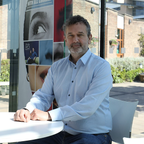
David Best
Professor of Addiction Recovery, Honorary Professor of Regulation and Global Governance, Leeds Trinity University, The Australian National University and Adjunct Associate Professor of Addiction Science at Monash University (Melbourne), Australia
Yellow Ribbon - Growing European Together (PID221)
Workshop Session
Yellow Ribbon - Growing European Together (PID221)
2.30pm – 3pm EDT, 4 September 2024 ‐ 30 mins
Workshop Session
Speakers

Gabriela Slováková
Director of the Criminal Policy Department, Ministry of Justice of the Czech Republic
Building Pro-social Support Networks, SPS & Desistors from DN (RRD) (PID179)
Workshop Session
Building Pro-social Support Networks, SPS & Desistors from DN (RRD) (PID179)
2.30pm – 3pm EDT, 4 September 2024 ‐ 30 mins
Workshop Session
Singapore Prison Service (SPS)’s approach to rehabilitation and reintegration results in a low and stable two-year recidivism rate of around 20%. SPS provides inmates with programmes to address criminal thinking, substance abuse, and interpersonal violence, alongside opportunities for work, skill development, and education. Beyond these, SPS recognises that most inmates do not have strong social capital for sustained desistance, therefore, intentional efforts are required to build up inmates’ pro-social capital to promote desistance.
The Desistor Network (DN) was set up in 2023 to create a strong network where desistors can enhance their connection to the community, strengthen their competencies and harnessing opportunities for positive impact. Some of the initiatives include community of practice sessions organised to facilitate desistors’ and volunteers’ sharing of best practices in the areas of support groups and mentoring. Through DN, we envision engaging every desistor, connecting and empowering them to contribute meaningfully to the community.
SPS also introduced the Volunteer Case Officer Scheme In 2023. It leveraged experienced volunteers, as well as suitable students from Institutes of Higher Learning, to provide case management, counselling, and prosocial support to the supervisees serving their remaining sentence in the community. Some of these VCOs are ex-offenders who want to contribute back to the cause of helping the inmates in the desistance journey as they understand the challenges through their lived experiences. SPS’s efforts to mobilise the community helps to create an ecosystem of community support to help ex-offenders desist from crime and drugs for good.
Speakers


Reclaiming Parenthood: A Systemic Approach to Supporting Incarcerated Parents, New Life Stories (PID129)
Workshop Session
Reclaiming Parenthood: A Systemic Approach to Supporting Incarcerated Parents, New Life Stories (PID129)
2.30pm – 3pm EDT, 4 September 2024 ‐ 30 mins
Workshop Session
The New Life Stories (NLS) Family Strengthening Programme (FSP) emphasises the importance of maintaining the parental role for incarcerated individuals through systemic practice. This approach focuses on holistic development and relationship mending within families affected by incarceration.
The FSP encompasses a comprehensive set of services aimed at addressing the multifaceted impacts of incarceration on families, promoting parental atonement and enhancing parent-child relationships. Using evidence from local case studies, it demonstrates the significant influence of systemic practice on reducing recidivism rates, bolstering parental confidence, and improving child literacy.
Despite its successes, the FSP faces multiple challenges when working with the families and other agencies. To combat these issues, NLS employs continuous assessment and feedback mechanisms, ensuring the program's adaptability to the dynamic needs of participating families.
Overall, the FSP stands as a testament to the power of systemic practice in rehabilitating incarcerated individuals and strengthening family bonds, highlighting the critical role of familial connections in successful societal reintegration. This presentation seeks to attract participants interested in the intersection of systemic practice, family dynamics, and the rehabilitation of incarcerated parents, offering insights into the transformative potential of targeted, relationship-centric interventions.
Speakers
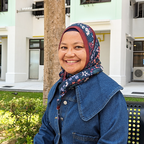

The Learning Hub, SPS (PID192)
Workshop Session
The Learning Hub, SPS (PID192)
2.30pm – 3pm EDT, 4 September 2024 ‐ 30 mins
Workshop Session
The Learning Hub initiative is a ground-up endeavour that embraces the concept of inmates as part of the value chain aimed at advancing desistance.
The Learning Hub’s motto is “For Inmates by Inmates”. Through this initiative, suitable inmates are identified and trained to lead and conduct learning courses, rehabilitative programmes, peer support groups, out-of-class activities, and mentorship sessions for fellow inmates. The programmes keep inmates meaningfully engaged. At the same time, it provides opportunities for them to develop themselves by learning new skills and knowledge. This multifaceted approach aims to engage minds, enrich lives, and foster emotional growth within the Correctional Unit.
Speakers

Enabling Desistance through Culturally Nuanced Support: FITRAH’s Approach to Rehabilitating Malay/Muslim Offenders and Their Families, FITRAH (PID191)
Workshop Session
Enabling Desistance through Culturally Nuanced Support: FITRAH’s Approach to Rehabilitating Malay/Muslim Offenders and Their Families, FITRAH (PID191)
2.30pm – 3pm EDT, 4 September 2024 ‐ 30 mins
Workshop Session
FITRAH, an office established by the Islamic Religious Council of Singapore, provides culturally-nuanced programmes and initiatives to meet the spiritual and emotional needs of Malay/Muslim (MM) inmates and their families throughout their incarceration period and beyond. This presentation will highlight how FITRAH works with the community to support MM inmates and their families to achieve long-term desistance, in line with ICPA 2024's theme of ‘Enabling Desistance: Beyond Recidivism’.
The presentation will showcase FITRAH's carefully designed programmes and services that incorporate Islamic values and teachings, as well as their collaboration with the Malay/Muslim Organisation Rehabilitation Network. It will also highlight the role of mosque volunteers in bridging ex-offenders to the community and promoting desistance through pro-social support and activities.
FITRAH's multi-dimensional approach, which includes engaging volunteers for both religious and non-religious programmes, and their collaboration with various organisations, has contributed to positive improvements in Malay recidivism rates.
Speakers

Mohamed Farik Omar
Executive Director, Islamic Religious Council of Singapore (MUIS)/ FITRAH office, Singapore
ISCOS Titans: A Journey of Reintegration, Resilience and Restoration, ISCOS (PID025)
Workshop Session
ISCOS Titans: A Journey of Reintegration, Resilience and Restoration, ISCOS (PID025)
2.30pm – 3pm EDT, 4 September 2024 ‐ 30 mins
Workshop Session
The ISCOS Titans Programme, initiated in 2017, facilitates the successful reintegration of ISCOS Members (ex-offenders/desistors) into society. It recognizes their resilience and provides opportunities for them to contribute positively to their communities. The selection process is stringent, ensuring candidates have been released from prison for at least three years, are gainfully employed or retired, have a strong support network, and no pending police cases. New Titans undergo comprehensive onboarding, including individualized engagement sessions and pairing with existing Titans for mentorship.
To retain and recognize Titans, ISCOS offers monetary honorarium and nominates them for prestigious awards like the Yellow Ribbon Awards and Prison Volunteers Awards. Titans contribute significantly by facilitating community support groups, delivering motivational talks, and supporting key programs in prisons. Their efforts aim to promote successful reintegration, inspire positive change, and foster inclusivity within communities. Through their resilience and commitment, Titans embody the spirit of overcoming personal obstacles and making a meaningful impact on others' lives.
Speakers

Ravan Kumar
Manager, Programme Strategist, ISCOS – Industrial & Services Co-operative Society Limited, Singapore

Women Supporting Women: The power of peer support groups in A4, SPS (PID187)
Workshop Session
Women Supporting Women: The power of peer support groups in A4, SPS (PID187)
2.30pm – 3pm EDT, 4 September 2024 ‐ 30 mins
Workshop Session
This presentation explores the use of gender-responsive approaches and peer support groups to address the needs of women offenders in Singapore. In the women’s correctional institution, there are support groups for mothers as well as for women undergoing grief and losses. Uncover the potential for transformation within our peer-led Grief Support Group, where women are empowered to self-facilitate learning circles. Join us as we share skill-building strategies to enhance participants self-efficacy and benefit from peer led sessions.
Tailored for female inmates who experienced the loss of loved ones such as pregnancy loss, this initiative also references the trauma-informed and strengths-based approaches that are grounded in gender-responsive principles. Experience the positive feedback from participants and learn how our approach fosters emotional healing, improved self-regulation, and support-seeking behaviours. Be part of our journey as we share how we navigate challenges while striving to respond to the specific needs of the women offender population and promote a culture of empowering offenders to take control of their rehabilitation.
Speakers


Women Offenders with Mental Disorders in Psychiatric Correctional Unit at Institution A4 (PID184)
Workshop Session
Women Offenders with Mental Disorders in Psychiatric Correctional Unit at Institution A4 (PID184)
3pm – 3.30pm EDT, 4 September 2024 ‐ 30 mins
Workshop Session
This presentation highlights the unique mental health challenges faced by female offenders with Mental Disorders (OMD). While the Psychiatric Correctional Unit (PCU) programme is similar for both male and women OMDs, the presentation highlights the unique mental health challenges faced by the women offenders, and the holistic and collaborative approach being used to meeting their specific rehabilitation and reintegration needs to ensure their successful return to society as contributing citizens. The Singapore Prison Service (SPS) partners the Institute of Mental Health (IMH) in managing OMDs. Selected OMDs are housed in Psychiatric Correctional Unit (PCU) to receive comprehensive psychiatric treatment and rehabilitation.
Speakers

Joanne Chow
Officer In Charge, Correctional Unit, Singapore Prison Services, Singapore
Empowering Rehabilitation Through Sports: The ‘Run for Our Life’ Program’s Journey from Incarceration to Community Reintegration, SideBySide (PID087)
Workshop Session
Empowering Rehabilitation Through Sports: The ‘Run for Our Life’ Program’s Journey from Incarceration to Community Reintegration, SideBySide (PID087)
3pm – 3.30pm EDT, 4 September 2024 ‐ 30 mins
Workshop Session
The "Run for Our Life" program by SideBySide, in collaboration with the Hong Kong Correctional Services Department since November 2022, showcases the impact of Sports Social Work Intervention (SSWI) on incarcerated individuals and ex-offenders. It aims to enhance rehabilitation, facilitate reintegration into society, and reduce recidivism by addressing physical, emotional, and social challenges. This comprehensive initiative progresses through four key phases: introducing incarcerated individuals to physical activity inside prison, advancing their training and integrating them into local competitions within the community, preparing them for international competitions and professional development in sports, and finally, transitioning successful participants into peers and mentors for new entrants at the prison.
Preliminary outcomes as the program enters its fourth phase are promising, with participants showing notable improvements in sleep quality, self-efficacy, resilience, emotional health, and social connections after competing in the International Yellow Ribbon Run 2023 in Singapore. These positive trends indicate not only the program's success in meeting its initial goals but also in significantly enhancing participants' overall quality of life. As it moves to ensure participants lead a crime-free life, the effectiveness of incorporating sports into correctional and community support systems appears substantial. This innovative approach offers valuable insights for future initiatives aiming at rehabilitative and reintegration success through physical activity and social support.
Speakers

Ka Lok Edison Lau
Senior Manager, SideBySide (Formerly known as The Society of Rehabilitation and Crime Prevention, SRACP), Hong Kong

Connection Before Correction: Strengthening Youth Offender Rehabilitation Through Family Engagement, MSF (PID136)
Workshop Session
Connection Before Correction: Strengthening Youth Offender Rehabilitation Through Family Engagement, MSF (PID136)
3pm – 3.30pm EDT, 4 September 2024 ‐ 30 mins
Workshop Session
The involvement of families in the youth offending landscape is a critical component in fostering positive outcomes for young persons in conflict with the law. This presentation explores the family engagement strategies adopted by two agencies within MSF that support the rehabilitation and reintegration of youth offenders. By examining the impact of familial involvement on promoting accountability, fostering a sense of belonging and reducing recidivism, this session aims to offer useful insights on the importance of collaborative efforts between MSF officers, the community, and families of youth offenders.
Through insightful discussions and sharing on practical strategies, this presentation seeks to share the belief that by prioritizing connection before correction, we can guide families to build trust, understand and develop positive relationships with their youths, which lays the foundation for sustainable rehabilitation and successful reintegration into society. This presentation hopes to inspire participants to recognize the transformative power of family partnerships in the youth offending landscape and ignite innovation within participants to create new ways of engaging families.
Speakers

Rouisanna Wong
Assistant Director, Youth Residential Service / Ministry of Social and Family Development, Singapore

Ru Ting Tham
Senior Manager, Probation and Community Rehabilitation Service, Ministry of Family and Social Development, Singapore
Activating Lived Experiences in Rehabilitation through Restorative Practices (RP) within Corrections, SPS (PID198)
Workshop Session
Activating Lived Experiences in Rehabilitation through Restorative Practices (RP) within Corrections, SPS (PID198)
3pm – 3.30pm EDT, 4 September 2024 ‐ 30 mins
Workshop Session
Correctional agencies face a variety of systemic challenges that require fresh, innovative solutions. Sometimes perceived as a school of crime or a centre of harm, the prison environment is fraught with intricate power dynamics. These dynamics extend beyond the culture of ‘us’ vs ‘them’ between incarcerated individuals and staff, encompassing other variables such as gang culture, antisocial attitudes, behaviours, and relationships.
Persons with lived experience, including those who have spent time in prison or who have been victims of crime, offer unique insights what is effective and ineffective within the criminal justice system. The Empatherapy and Peer Supporter Academy are initiatives grounded in Restorative Practices and have been collaboratively designed by individuals with lived experiences, correctional officers, correctional rehabilitation specialists, and psychologists.
This presentation discusses the impact of meaningfully including individuals with lived experiences at the heart of rehabilitation initiatives, from designing and planning to implementing the projects that result in transformative effects within the correctional agency. It also highlights the myriads of benefits that individuals with lived experience bring to the criminal justice system, the barriers they face, and strategies to support their progress.
Speakers


Andrew Joseph Ng
Trainer, Lutheran Community Care Services (LCCS) and Industrial and Services Co-operative Society Limited (ISCOS)
Community partnership in building a evidence-based, customised curriculum for mothers in prison to support children and families of drug offenders, WIRA (PID051)
Workshop Session
Community partnership in building a evidence-based, customised curriculum for mothers in prison to support children and families of drug offenders, WIRA (PID051)
3pm – 3.30pm EDT, 4 September 2024 ‐ 30 mins
Workshop Session
Singapore Prison Service and its community partner Women in Recovery Association (WIRA) entered into a rare collaboration in 2022-2023 to design an evidence-informed, customised 10-session curriculum for incarcerated women to help them better navigate their role as mothers when they return home to their children and families. Using a ground-up approach, WIRA recruited a small group of mothers in prison to gather their views on what challenges they faced as mothers and what help they needed when they will rejoin their children and families upon release. With the data gathered, WIRA set about to design a 10-session curriculum covering topics such as self-identity, emotion regulation, motherhood, communication with children and adult caregivers.
A pre and post-course survey was designed to evaluate the impact of the intervention. Statistically significant outcomes were seen in terms of changes in knowledge, awareness and behaviour of course participants. WIRA and SPS are now working on a timetable to roll out the course to more women in prison in 2024.
Speakers


Dr Asha Rathina Pandi
Head of Research and Lead Analyst, North South Initiative, Selangor, Malaysia
Life Behind Bars: Breaking the Cycle of Reoffending, BTC (PID114)
Workshop Session
Life Behind Bars: Breaking the Cycle of Reoffending, BTC (PID114)
3pm – 3.30pm EDT, 4 September 2024 ‐ 30 mins
Workshop Session
To break a bad habit, you need to replace that with a new habit. And cycling is a fantastic new habit to introduce to ex-offenders. It is easily accessible and fun!
The goal for Break the Cycle (BTC) is to reduce the re-offending rate in Singapore by supporting the reintegration of ex-offenders during the aftercare phase. These requires a pool of mentors who are ex-offenders whom have successfully broken their cycle of re-offending, and also a community that is inclusive to readily accept ex-offenders.
Come and learn the lessons and stories from how BTC is making a difference with a life behind prison bars to handle bars through cycling.
Speakers


Empowering Incarcerated Expectant Mothers: Promoting Safety and Well-being for Babies to Thrive, Fei Yue Community Services (PID075)
Workshop Session
Empowering Incarcerated Expectant Mothers: Promoting Safety and Well-being for Babies to Thrive, Fei Yue Community Services (PID075)
3pm – 3.30pm EDT, 4 September 2024 ‐ 30 mins
Workshop Session
“Project Baby” is a joint initiative by Fei Yue Family Resource Centre and Safe Place that aims to support pregnant women incarcerated in Singapore. The programme, conducted in Prison, has served a total of 60 women since January 2020, with a total of 15 runs conducted as of December 2023. This programme aims to support pregnant mothers to meet the present needs, support the growth of child, and also strengthens maternal identity and works towards this significant event of pregnancy and motherhood becoming turning points for some incarcerated women as they strive to be the best mothers they can be and achieve desistance from crime.
Speakers

Janet Liam
Assistant Director/Assistant Senior Social Worker, Fei Yue Community Services, Singapore

Break and Exhibition
Coffee Break
Break and Exhibition
3.30pm – 4pm EDT, 4 September 2024 ‐ 30 mins
Coffee Break
Juveniles Network
Workshop Session
Juveniles Network
4pm – 5pm EDT, 4 September 2024 ‐ 1 hour
Workshop Session
- Identify and share evidence-based best practices in juvenile justice policies and practices;
- Support universal application of acceptable code of practice standards/recommendations;
- Promote safe and humane youth housing;
- Encourage age-appropriate programming, education and structured activities;
- Support the United Nations Mandela Minimum Rules;
- Advance professional education and awareness of the juvenile justice population needs to stakeholders;
- Encourage broad application of family engagement policies and practices;
- Advance juvenile justice tracks for ICPA conferences on topics such as youth housing, conditions of confinement, youth programming, reduction of isolation and restraints, positive youth outcomes and others.
Speakers

Richard I. Robinson
Senior Corrections Advisor, US Department of State - INL KM/TAD, United States
Planning and Design Network
Workshop Session
Planning and Design Network
4pm – 5pm EDT, 4 September 2024 ‐ 1 hour
Workshop Session
- Assemble as many existing physical plant standards/guidelines that impact prison design as can be identified;
- Examine the “dozen” critical guidelines (e.g., space allocation per prisoner for sleeping) that every prison department should aim to achieve;
- Cross reference these critical guidelines with existing minimum standards;
- Identify how and where these guidelines could be included in the UN Minimum Rules;
- Assemble a catalogue of essential technology for consideration by: Developed nations; Developing nations, and Post-conflict/disaster conditions.
- Begin the preparation of a basic design guidelines document with examples.
Speakers

External Prison Oversight and Human Rights Network
Workshop Session
External Prison Oversight and Human Rights Network
4pm – 5pm EDT, 4 September 2024 ‐ 1 hour
Workshop Session
Speakers

Dr. Ivan Zinger
Correctional Investigator, Canada's Office of the Correctional Investigator, Canada
Volunteers Network
Workshop Session
Volunteers Network
4pm – 5pm EDT, 4 September 2024 ‐ 1 hour
Workshop Session
- Create an international community of organizations that benefit from having volunteers in their correctional system.
- Explore the development of evidence-based documentation to increase the understanding of the important role volunteers play in corrections.
- Promote dialogue on the successes and challenges of working with volunteers.
- Develop standards and guidelines on the management of volunteers.
- Provide assistance, support and information to jurisdictions wanting to build a volunteer network.
Speakers


Julie Renaud

Welcome Cocktail
Evening Event
Welcome Cocktail
7pm – 8pm EDT, 4 September 2024 ‐ 1 hour
Evening Event
Not My Crime, Still My Sentence: Ensuring a Child Rights-Based Approach When a Parent Goes to Prison (PID038)
Plenary Session
Not My Crime, Still My Sentence: Ensuring a Child Rights-Based Approach When a Parent Goes to Prison (PID038)
9am – 9.45am EDT, 5 September 2024 ‐ 45 mins
Plenary Session
People who maintain positive family ties while in prison are less likely to reoffend on release, but why? What is the evidence base for this, where are the gaps in evidence, and what are the risks? What do we know now, and what more do we need to know to make such an approach work in practice? For the last year, the ASPIRE project reviewed the School Zone model and explored (through collaboration with families, prisons, schools, public health, voluntary organisations, and key policy makers) whether a similar model should be extended to children and families across Wales. Prof Nancy Loucks provides an overview of this research and the wider research into the benefits of supporting family ties but also questions this in the context of child protection and children's human rights, arguing that children and families need to be supported and recognised as more than a tool for resettlement.Speakers

Professor Nancy Loucks PhD OBE
Chair, International Coalition for Children with Incarcerated Parents, United Kingdom
Reimagining Incarceration With the New American University: A Holistic, Strengths-Based Approach to Empower People in Prison (PID024)
Plenary Session
Reimagining Incarceration With the New American University: A Holistic, Strengths-Based Approach to Empower People in Prison (PID024)
9.45am – 10.30am EDT, 5 September 2024 ‐ 45 mins
Plenary Session
If we instead conceive of correctional success as a ‘better-than-arrival,’ strengths-based, holistic focus on increasing the well-being of people who live and work in correctional facilities, then we can expand the challenge and possible solutions beyond criminology and criminal justice.
Institutions of higher education could assume an increased importance in a reimagined correctional system designed to enhance well-being. This presentation describes the design and demonstration site implementation of the Arizona State University (ASU) POINT Model (Potential, Opportunity, Investment, Nurture, and Transformation). The POINT Model invests in people who live and work in prison using university resources to enhance social, economic, cultural, emotional, educational, and overall well-being.
Our work at ASU—an institution repeatedly ranked first in the United States for innovation and driven by a charter to measure ourselves by whom we include and how they succeed—can set an example for a new future for corrections in partnership with institutions of higher education.
Speakers

Kevin Wright PhD
Director, Arizona State University Center for Correctional Solutions, Arizona State University, United States
Coffee Break and Exhibition
Coffee Break
Coffee Break and Exhibition
10.30am – 11am EDT, 5 September 2024 ‐ 30 mins
Coffee Break
‘I Made the Mistakes, so you Don’t Have to’: Practical Considerations for Integrating Lived Experience Into Criminal Justice Service Delivery (PID137)
Workshop Session
‘I Made the Mistakes, so you Don’t Have to’: Practical Considerations for Integrating Lived Experience Into Criminal Justice Service Delivery (PID137)
11am – 11.30am EDT, 5 September 2024 ‐ 30 mins
Workshop Session
Services delivered in criminal justice settings by Justice Involved people have improved levels of engagement and retention. Lived Experience models of delivery often use mentoring, with proven reciprocal benefits to both mentors and mentees in improving desistance. The Ingeus UK justice business has been developing different approaches to Lived Experience for over 10 years. An average of 17% of our Justice workforce have Lived Experience, with most having been Ingeus service users before becoming members of staff. This presentation shares learning of delivering Lived Experience models for those working in criminal justice settings covering:• Our Academy Model, which creates a structured pathway from service user, through volunteer support and peer mentoring, to paid employment as a route out of offending.
• Practical tools and tips the management of an impactful Lived Experience programme.
• The impact of services and how our experience compares with academic studies of mentoring and Lived Experience.
• Examples of how our Academy provides opportunities to achieve tertiary desistance.
We will conclude the presentation using stories (videos) of people with Lived Experience in their own words, setting out how they have benefited from and helped others through the approach.
In 2023, Ingeus commissioned an independent review of our Lived Experience model. This highlighted improved outcomes both for service users and for Lived Experience participants, as well as benefits for Ingeus as an employer with improved retention, shorter recruitment times, and fewer sick days, from those who had participated in the programme.
Speakers


Enforcing humane and proper sanctions with a focus on social rehabilitation: swimming against the tide? (PID085)
Workshop Session
Enforcing humane and proper sanctions with a focus on social rehabilitation: swimming against the tide? (PID085)
11am – 11.30am EDT, 5 September 2024 ‐ 30 mins
Workshop Session
The presentation will focus on the Council’s advising of the government on enforcing of sanctions in a humane and legally correct manner and in accordance with principles of proper treatment of individuals. In doing so, the Council considers the interests of detainees, the interests of victims of crime and relatives and the interests of public safety.The Council carries out its tasks in a social environment with a growing gap between the legal task of the government to secure a humane and proper treatment, while reducing harm and facilitate re-integration on the one hand and a political climate of harsher punishing and lesser rights for prisoners on the other hand. This will be explained through several cases from the Dutch practice.
Next to focusing on the Dutch practice, the presentation will also briefly explain the role of the Council within the Dutch governmental situation and will be finalised with a call to the participants to identify their national organisations of the same kind as the Dutch Council, be it on the advisory or the jurisdiction work, or both. The Council's goal is to build up a worldwide network for mutual assisting through knowledge sharing.
For that reason, of course, a workshop will be appreciated, however, a plenary slot even more.
Speakers

Han Moraal LLM MPA
Chair, Council for the Administration of Criminal Justice and the Protection of Juveniles (RSJ)
Family Befriending: Improving reintegration outcomes for individuals and mitigating impact of incarceration on families (PID146)
Workshop Session
Family Befriending: Improving reintegration outcomes for individuals and mitigating impact of incarceration on families (PID146)
11am – 11.30am EDT, 5 September 2024 ‐ 30 mins
Workshop Session
Singapore Aftercare Association (SACA) and Singapore Prison Service (SPS) recognise the adverse impact of incarceration on inmates and their families. There is a need to support families and inmates in navigating the challenges brought about by incarceration, mitigate the negative impacts on families and consequently, reduce the risk of intergenerational offending.This presentation will showcase SACA’s Family Befriending (FB), a pilot initiative in collaboration with SPS, which aims to achieve the above-mentioned objectives. Trained volunteers are tapped on to provide regular befriending to inmates and their families during the in-care phase and for 3 months after inmates’ release. Apart from emotional support, befrienders serve as eyes on the ground to identify families’ needs and recommend relevant services or resources. Inmates and their families are also encouraged and brought together to express their thoughts and feelings about the incarceration and other immediate concerns during a Family Group Conference (FGC), where they jointly develop an action plan to make decisions about their future. The FGC is facilitated by SPS facilitators and conducted prior to the inmates’ release.
Lastly, this presentation will discuss implementation challenges in running the FB pilot initiative, through the use of real life case studies and sharing of personal experiences by the parties involved in this process.
Speakers


Karen Wong
Senior Assistant Director (Correctional Rehabilitation Services Branch, Penal), Singapore Prison Service

One Size Does Not Fit All Female Prisoners: Moving Away from Traditional Essentialist Educational Approaches Towards Intersectional-Focused Approaches (PID107)
Workshop Session
One Size Does Not Fit All Female Prisoners: Moving Away from Traditional Essentialist Educational Approaches Towards Intersectional-Focused Approaches (PID107)
11am – 11.30am EDT, 5 September 2024 ‐ 30 mins
Workshop Session
Currently, gender-responsive approaches for female prisoners tend to adopt essentialist approaches that homogenise the diverse backgrounds and experiences of female prisoners. This is done by the assumption that the challenges, needs and complexities of one group of female prisoners are the same as those of another group of female prisoners. Little or no attention is paid to the intersections of gender and race and the multiple disadvantages/inequalities these create in a prison setting. Consequentially, the voices and experiences of those prisoners concerned become conspicuously silent – silenced by the essentialist approaches.
Anti-essentialist approaches advocate for tailored programming that acknowledges and addresses the diverse identities, needs, aspirations, and challenges of incarcerated women. By embracing diversity and inclusivity, anti-essentialism promotes educational strategies that resonate with the lived experiences of female inmates, fostering engagement and empowerment.
Therefore, this paper critically examines what an intersectional-focused approach can look like in the education of female prisoners. Using the intersectional lens of gender and race, it explores strategies and approaches policymakers, educators, and practitioners can adopt to contribute significantly to promoting desistence among incarcerated women, along with addressing systemic barriers which could enhance the efficacy of rehabilitation efforts and increase the likelihood of successful reintegration into society.
Speakers

Grace Famoriyo
Course Director/Lecturer/Researcher/Magistrate, Anglia Ruskin University, United Kingdom
Reducing the harms of incarceration, the role the socio-educational service in the Senegal Penitentiary Administration (PID300)
Workshop Session
Reducing the harms of incarceration, the role the socio-educational service in the Senegal Penitentiary Administration (PID300)
11am – 11.30am EDT, 5 September 2024 ‐ 30 mins
Workshop Session
By examining the functioning of the Senegalese prison system, we realize that the history that has accompanied the care of inmates has evolved in a positive way. The Ministry of Justice has initiated reforms aimed at improving detention conditions and combating the harms of incarceration. In the justice sector programme, emphasis has been placed on the care aspect of prisoners. Today, in the wake of the expansion of the public space, the prison institution has become a political, legal and humanitarian issue around which multiple actors cooperate or confront each other with often very different approaches and objectives. All the institutional solutions envisaged to improve conditions of detention and reduce prison overcrowding are of a judicial nature. The Prison Administration is taking advantage of these institutional solutions, by devoting itself more to its mission of preparing for the return to prison.
However, the Prison Administration does not claim to have solved the problem related to the harms of incarceration given the particularity of this area in Senegal. However, the qualitative and quantitative efforts that have been made have had an impact on the well-being of the detainees should be recognized. If we compare it to other countries that are in the same conditions of historical development, Senegal has made significant progress that can inspire. Indeed, in terms of infrastructure, the rehabilitation and refurbishment of some prisons has allowed the expansion and ventilation of the premises. The social and political transformations noted since 2000 have pushed different groups in society to define new objectives. At the legislative and regulatory level, the amendments made to the CPP and the SCC, and the signing of Decree 2001-362 have constituted instruments of integration and opened the way for partners. This novelty has become a key element in the fight against the dissocializing effects of incarceration through the expression of Senegalese solidarity in prisons. An analysis of the impact and contribution of partners in Senegalese prisons shows that it is of paramount importance. It should be mentioned that this emergence of benefactors has a positive influence on the prison space. It is imperative to recall, in conclusion, that in order to fight for the well-being of prisoners, everyone have to draw inspiration from the humanist approach of some who have opted to assist and not judge the convicted person for the execution of his sentence.
Speakers

Rose Sarr
Head of Communication and international desk, General Directorate of Penitentiary Administration, Senegal

Samba Diouf
Director of Legal Affairs, Planning, Statistics and Penitentiary Establishments, Senegal Penitentiary Administration
(CANCELLED) Desistance From Crime: A Highly Overlooked Protective Factor in Actuarial Risk Assessment (PID070)
Workshop Session
(CANCELLED) Desistance From Crime: A Highly Overlooked Protective Factor in Actuarial Risk Assessment (PID070)
11am – 11.30am EDT, 5 September 2024 ‐ 30 mins
Workshop Session
Using data from 59,676 individuals given community sentences in Sweden, we developed the model, considering criminal, sociodemographic, and clinical factors. Employing a dynamic prediction method, we accounted for adverse events, changes in circumstances, and crime desistance.
Our model tool demonstrated robust calibration and discrimination (c-index = 0.74 for violent reoffending, 0.69 for general reoffending). We also demonstrated that if used for continuous monitoring, conventional risk assessment tools tend to overestimate recidivism risk over time, highlighting the need for dynamic monitoring.
Our model offers sensitive risk estimates adaptable to individual changes and distance from crime. Implementing such dynamic models could enhance risk stratification for those with psychiatric disorders under supervision, improving service provision and outcomes.
Speakers

Dr Denis Yukhnenko MSc DPhil
Postdoctoral Researcher, University of Oxford, United Kingdom
Transforming Corrections in Erie County, New York (PID090)
Workshop Session
Transforming Corrections in Erie County, New York (PID090)
11am – 11.30am EDT, 5 September 2024 ‐ 30 mins
Workshop Session
Speakers

Thomas Diina
Chief, Division of Community Reintegration, Erie County Sheriff's Office, United States

Felicia Beard
Associate Vice President, Racial Equity Initiatives, Community Foundation for Greater Buffalo, United States
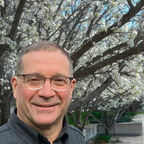
Technology Solutions Network
Workshop Session
Technology Solutions Network
11am – 12.30pm EDT, 5 September 2024 ‐ 1 hour 30 mins
Workshop Session
- Assemble and share technology solutions, implementations and digital strategy development practices across jurisdictions;
- Promote and support research and evaluation practices related to the usage of technology in Corrections;
- Challenge ICT and technology providers to address specific corrections-specific needs and problems;
- Support world-wide members to use technology for improving the effective delivery of correctional services, improve efficiency and effectiveness;
- Support the development and usage of technology and data/information standards.
Speakers

Rehab. Prog. in the Botswana Prisons and Their Effectiveness in Reintegrating Offenders and Curbing Recidivism: A Qualitative Situational Analysis of the Lived Experiences of Ex-prisoners (PID122)
Workshop Session
Rehab. Prog. in the Botswana Prisons and Their Effectiveness in Reintegrating Offenders and Curbing Recidivism: A Qualitative Situational Analysis of the Lived Experiences of Ex-prisoners (PID122)
11.30am – 12pm EDT, 5 September 2024 ‐ 30 mins
Workshop Session
It is essential that the various programs undertaken by the correctional officials inside prison for the rehabilitation of prisoners' dovetail with the social and economic conditions obtaining in the mainstream society. Conditions in the labour market, family environment, the community as well as peer associations prevalent in the mainstream society are pivotal for desistance. A misfit between rehabilitation and reintegration condemns ex-prisoners’ to recidivism. The lived experiences of prisoners in this study reflect bleak opportunities in the social and economic environment. The skills they acquire in prison do not serve their efforts to steer clear of crime due to the obscuring effects of their criminal record, stigma, and discrimination as well as the limited opportunities for them in the mainstream economy.Speakers
Enabling Desistance Through Community Engagement and Peer Support: The "Buddies" Project (PID073)
Workshop Session
Enabling Desistance Through Community Engagement and Peer Support: The "Buddies" Project (PID073)
11.30am – 12pm EDT, 5 September 2024 ‐ 30 mins
Workshop Session
This presentation showcases the impactful work of SideBySide in enabling desistance among ex-offenders through community engagement and inclusion. The "Buddies" project has successfully facilitated a shift in participants' self-identity from drug users to drug users volunteers and peer supporters, leading to increased social connections and improved well-being. The project's Social Return on Investment ratio of 2.20:1 underscores its significant non-financial benefits. Transitioning into its second phase, the project aims to further develop peer supporters and implement innovative programs like the Territory-wide Pilot Peer-in-a-Team initiative. Challenges such as specialized care for unstable participants and enhanced training for peer supporters are being addressed to ensure sustained success. Despite these challenges, the project has shown promising results in enhancing treatment motivation, reducing drug usage, and fostering community acceptance of rehabilitated individuals. The abstract highlights the project's commitment to fostering desistance and successful reintegration, setting the stage for continued progress in the upcoming phase.Speakers


Ka Lok Edison Lau
Senior Manager, SideBySide (Formerly known as The Society of Rehabilitation and Crime Prevention, SRACP), Hong Kong
Designing For Desistance (PID206)
Workshop Session
Designing For Desistance (PID206)
11.30am – 12pm EDT, 5 September 2024 ‐ 30 mins
Workshop Session
This workshop considers how design can contribute to supporting people’s desistance from crime. By design, we are not referring to a singular practice such as architecture, but the plural practices of design involved in the design of services, interactions, strategies, programs, products, buildings, landscapes, digital services, and interventions among others. Human-centred and customer-centred design approaches are a core way governments and organisations are developing services including those related to the justice system. To articulate what designing for desistance is, and its potential value, we utilise case studies of design projects undertaken by design researchers at the Designing Out Crime (DOC) research centre, Sydney Australia. DOC was closed in 2021, and while the work continues by numerous team members, this workshop is an opportunity to reflect, makes sense of and present a path forward for this work around designing for desistance. From this collection of case studies and practice, we articulate fundamental principles for a designing for desistance approach. This workshop concludes by describing a program of research proposed to substantiate the approach, develop new knowledge about plural design practices in these contexts and most critically create impact by supporting people’s desistance from crime.Speakers

The Women's Hive: Women's Reintegration Service Hub (PID101)
Workshop Session
The Women's Hive: Women's Reintegration Service Hub (PID101)
11.30am – 12pm EDT, 5 September 2024 ‐ 30 mins
Workshop Session
Women remain the fastest growing prison population in the country, and in addressing reintegration, women’s exposure and response to life circumstances post release are distinct from men, which emphasises the importance of doing something different, and working collectively with the whole community. The Women’s Hive was opened in Adelaide’s southern suburbs in October 2023. OARS Community Transitions (OARS CT) in collaboration with SA Department for Correctional Services (DCS) implementing a co-location model in Adelaide’s southern suburbs to provide services and support for women reintegrating into the community while also meeting their relevant statutory obligations. OARS CT case manager’s, counsellors and a coordinator are based at the Hive, as is the DCS Community Corrections Officer, sharing both the physical space and values.*Note this will be co-presented with the Department for Correctional Services SA, however presenter has not been determined at this stage.
Speakers

Hayley Mills
Executive Director, Community Corrections & Specialist Prisons, South Australian Department for Correctional Services
Making Rehabilitation a Reality – What Matters and What Doesn’t? How Prisons and Probation in England and Wales Operationalised a Whole Agency Approach to Rehabilitation (PID132)
Workshop Session
Making Rehabilitation a Reality – What Matters and What Doesn’t? How Prisons and Probation in England and Wales Operationalised a Whole Agency Approach to Rehabilitation (PID132)
11.30am – 12pm EDT, 5 September 2024 ‐ 30 mins
Workshop Session
• How we defined rehabilitation and established its relationship with desistance.
• How risk management, rehabilitation and desistance are complementary, rather than separate, outcomes
• What really matters when delivering rehabilitation in criminal justice organisations, including:
- Basing the approach on evidence, including an account of how we have drawn on desistance research and the Risk Need Responsivity model in an integrated approach.
- Taking into account the voice of those with lived experience of the criminal justice system
- The importance of relationships in promoting desistance
- The relevance of an organisational culture that focuses on rehabilitation
• Taking a strategic approach to targeting our service offer – investing in getting the basics right and layering our offer to support higher risk/need people.
• Promoting agency and responsibility.
• Reflections on the work so far including the voices of lived experience.
Speakers
Lived Experience of People Convicted of Sexual Offences Failing in Open Prison or on Release: How can Desistence be Supported? (PID148)
Workshop Session
Lived Experience of People Convicted of Sexual Offences Failing in Open Prison or on Release: How can Desistence be Supported? (PID148)
12pm – 12.30pm EDT, 5 September 2024 ‐ 30 mins
Workshop Session
Firstly, participants in a Scottish prison who had been released and then recalled to prison were interviewed. The findings gave three themes, which demonstrated ways in which these individuals felt scared, judged and unsupported in the community. Secondly, prisoners in an English prison who had been transferred to an open prison then recalled back to closed conditions were interviewed. The PCoSOs reported feeling overwhelmed with the initial transition from closed to open prison conditions and not adequately prepared. Participants discussed how their return to closed conditions had a negative impact upon them and their hope for the future.
Implications and recommendations from the participants in both pieces of research will be discussed, to probe what can be done to more enable desistence in open prison and release. This will be considered with literature on risk management with the PCoSO population and desistence theories. It is essential to listen to the voices and lived experiences of PCoSOs, if we do not, this group of people will continue to struggle to be successfully reintegrated into society, increasing the risk of future offending and victims.
Speakers

Natalie Parrett CPsychol, AFBPsS
Director of Psychological Services, Justice and Immigration, Serco, United Kingdom
Effectiveness of Peer Support in Desistance from Crime and Public-private Partnerships Involving Ex-offenders (PID081)
Workshop Session
Effectiveness of Peer Support in Desistance from Crime and Public-private Partnerships Involving Ex-offenders (PID081)
12pm – 12.30pm EDT, 5 September 2024 ‐ 30 mins
Workshop Session
In Japan, the Act for the Prevention of Recidivism came into effect in 2016, and the government has been pushing for collaboration with other organizations as a society-wide effort, including local governments and private organizations, to prevent recidivism. Peer support groups, in which ex-offenders support each other and work together to get back on their feet, are one of the most important counterparts to such collaboration. Unlike the conventional supervision and treatment of offenders by professionals for their rehabilitation, peer support is provided from an experience-based perspective that assists ex-offenders’ reintegration into society. Especially in recent years, peer support has been attracting attention from the perspective of desistance, and its effectiveness has been highly evaluated. This presentation will focus on the importance of peer support in facilitating desistance from crime and its effectiveness in cooperation with government.
Initially, I will present how peer support can help individuals disengage from crime, with the results of domestic and overseas research. In peer support groups, people with difficulties become peers and provide a safe place where they can be honest with themselves and prevent isolation through receptive attitudes and empathy toward each other. In the context of relationships with trusted peers, members share their own experiences, and through listening to others, they gain new insights and deepen their self-understanding, which leads to a process of inner transformation and rebuilding of prosocial identity. Peer support also gives its members an active role in contributing to others by drawing on their own past experiences. In the desistance research, it has been noted that the sense that one’s own life experiences have value and are useful in the recovery of others gives the person a sense of self-usefulness and motivates him to gain a proactive self as well as further recovery from his own crimes.
Next, good practices already in place in Japan and overseas will be introduced as resources for considering how to incorporate the experiences and knowledge of ex-offenders into recidivism prevention measures and how to maximize the strengths of peer support in the public social rehabilitation support system for offenders.
A well-known collaboration between ex-offenders and government is the “Expert by Experience” approach. This is an approach in which ex-offenders who have reintegrated into society after having experienced difficult situations firsthand help those who are now suffering from the very same situations, and offer the knowledge and perspectives gained from their experiences to policy making and service development. The Swedish peer support group KRIS has built a track record of success by supporting offenders in their recovery over many years and has gained the trust of society. KRIS is currently working with public institutions such as Swedish prisons, probation offices, and treatment centers for drug addicts. Also in Japan, peer support groups for drug addicts and social rehabilitation support organizations established by ex-offenders are working together to provide guidance and support for offenders to improve their lifestyle.
To conclude the presentation, I will share my thoughts on effective public-private partnerships to utilize the unique strengths of peer support and ex-offenders as experts by experience, including some points that we in the public sector should keep in mind.
Speakers

Naoki Tanaka
Professor, United Nations Asia and Far East Institute for the Prevention of Crime and the Treatment of Offenders (UNAFEI)

Yuho Furukawa
Professor, United Nations Asia and Far East Institute for the Prevention of Crime and the Treatment of Offenders (UNAFEI), Japan
Optimizing Priorities within Correctional Services: A Prioritization Matrix Approach to Addressing Desistance in the Uganda Prisons Service (PID205)
Workshop Session
Optimizing Priorities within Correctional Services: A Prioritization Matrix Approach to Addressing Desistance in the Uganda Prisons Service (PID205)
12pm – 12.30pm EDT, 5 September 2024 ‐ 30 mins
Workshop Session
In many countries, including Uganda, Correctional entities often face challenges in funding and resource allocation due to their perception as consumer entities rather than revenue generators. As a result, innovative approaches, including private management, have been explored to address the growing complexities of offender management. This abstract proposes a prioritization matrix analysis to evaluate correctional initiatives in alignment with its triple mandate of custody, rehabilitation, and production activities. Through structured evaluation against predefined criteria, including effectiveness, cost-efficiency, and impact on recidivism rates, this analysis aimed to rank Uganda Prisons Service initiatives and offer actionable insights for resource optimization. By leveraging data-driven insights and collaborative decision-making, correctional Services can enhance their capacity to deliver impactful rehabilitation programs, improve inmate outcomes, and contribute to broader public safety objectives. This presentation provides a strategic roadmap for UPS and stakeholders to navigate the complex landscape of correctional management and advance the objectives of justice and rehabilitation in the world.Speakers

Dr Onesmus Bitaliwo
Senior Superintendent of Prisons (SSP) Human Resource Management and Special Duties of the Commissioner General of Prisons, Uganda Prisons Service
Implementation of an Evidence-Based Programme for Women Offenders: A Namibian Perspective (PID056)
Workshop Session
Implementation of an Evidence-Based Programme for Women Offenders: A Namibian Perspective (PID056)
12pm – 12.30pm EDT, 5 September 2024 ‐ 30 mins
Workshop Session
Historically evidence-based programmes for corrections have been developed to address the needs of males, who comprise the majority of the inmate population. However, many studies have identified significant differences between women and males offenders and their implications in criminal offending. Today there is general consensus that the criminogenic factors of women offenders are distinct from that of males. Consequently this justified the need for gender specific programmes for women offenders. Against this background, Western correctional jurisdictions have developed and implemented several gender specific programmes that recognise women’s unique pathways into crime. Unfortunately, the same has not been the case in most African correctional jurisdictions. The Namibian Correctional Service stands out as one of the few correctional jurisdictions that have introduced a gender-specific programme for women offenders. The programme which is titled “A Women’s Programme” was adopted from Canada. The programme is premised on the risk-needs-responsivity principle which underpins the Namibian Correctional Service rehabilitation framework. This paper highlights how a western developed evidence-based programmes can be realistically implemented in the African context. In addition, the paper demonstrated innovative strategies employed by the consultant and Namibian Correctional Service to ensure that the programme is relatable to the Namibian women offender population. Interview with women who have participated in the programme revealed that the Women’s Programme increased insights into their personality, past traumas, crime and their relationships leading to greater self -awareness and a sense of hope for the future.
Speakers

Dr Ndeyapo Nafuka PhD
Head of the Directorate Rehabilitation, Namibian Correctional Service

Eleanor Mwasinga-Nawa MA
Head of Case Management Services at Windhoek Correctional Facility, Namibian Correctional Service
Measuring the Readiness for Desistance (PID186)
Workshop Session
Measuring the Readiness for Desistance (PID186)
12pm – 12.30pm EDT, 5 September 2024 ‐ 30 mins
Workshop Session
Recidivism rates are essential but limited, as they are unable to capture the nuances in offenders’ behavioural change and only provide feedback two to five years after an inmate's release. Therefore, Singapore Prison Service is exploring a range of indicators beyond recidivism rates to measure individual and rehabilitation effort success. One project we have initiated involves the development of a new quantitative measure to indicate inmates’ progress towards desistance.This presentation offers an overview of the Desistance Quotient (DQ) tool and its development roadmap. The DQ measures a range of domains, including attitudes towards drugs and offending, perceived social support, and motivation to change. We aim for inmates to complete the DQ at specific milestones during their incarceration and while serving community-based programmes. The aggregated results will provide timely individual and organisational-level feedback on the effectiveness of current efforts and activities in promoting desistance. This presentation will also provide an interim analysis of DQ’s statistical reliability, validity, and factor structure. The DQ aims to promote more effective rehabilitation efforts and ultimately facilitate long-term desistance.
Speakers


(CANCELLED) Support, Not Monitor: How Integration Is Part of Prevention (PID164)
Workshop Session
(CANCELLED) Support, Not Monitor: How Integration Is Part of Prevention (PID164)
12pm – 12.30pm EDT, 5 September 2024 ‐ 30 mins
Workshop Session
There is a prominent tendency from prison officials, and the criminal justice system in general, to impose a substantial number of conditions on people under surveillance. But what if, rather than protect society, these conditions set individuals up to fail before they are even released? We tend to forget that people who have been convicted of serious criminal offenses never had a feeling of belonging to our society. The first step to successful integration is definitely to build this feeling of belonging.Through the study of practical cases, we will reflect on alternatives to traditional surveillance measures that would favour real support and follow-ups instead of focusing on strict monitoring. A special emphasis will be put on indigenous and dangerous offenders cases. The discussion will reflect on different avenues, including principles of restorative justice and of healing processes, that could have been explored in these cases to allow a different outcome. Participants will be provided with release approaches based on tangible experiences from people who have been convicted of crimes and have gone through a release process.
Speakers

Transforming Justice: A Personal Journey and a Call to Action (PID098)
Workshop Session
Transforming Justice: A Personal Journey and a Call to Action (PID098)
12pm – 12.30pm EDT, 5 September 2024 ‐ 30 mins
Workshop Session
Speakers
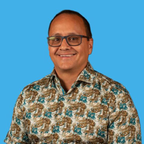
Lunch and Exhibition
Lunch
Lunch and Exhibition
12.30pm – 1.30pm EDT, 5 September 2024 ‐ 1 hour
Lunch
The Vital Role of Healthcare in Reentry Success (PID171)
Workshop Session
The Vital Role of Healthcare in Reentry Success (PID171)
1.30pm – 2pm EDT, 5 September 2024 ‐ 30 mins
Workshop Session
This session will provide an overview of the fatal problems that stem from a lack of access to current health data for recently released offenders. This leads to significantly higher mortality and morbidity rates vs the general population. We will review several factors that contribute to the problem, such as fragmented health records, challenges in inter-agency data sharing, offender participation, and data privacy and security requirements. The session will then propose possible solutions based on insights from public safety and health care solution implementation, such as the value and role of national integrated health records, digital systems that transition health data between incarceration, parole, and release, and a perspective on how holistic and person-centered health care for offenders can address their physical and mental health needs. A mentally and physically healthy former offender is one that has a high probability of rehabilitation and desistance. Solving for data availability is vital to achieving this goal.Speakers

Hazel Wheldon
Strategic Advisory - Public Safety Solutions, Momentai Consultants / Multi-Health Systems Inc., Canada

A Pathway to Sustainable Rehabilitation Enabling Desistance; Beyond Recidivism in Correctional Service (PID093)
Workshop Session
A Pathway to Sustainable Rehabilitation Enabling Desistance; Beyond Recidivism in Correctional Service (PID093)
1.30pm – 2pm EDT, 5 September 2024 ‐ 30 mins
Workshop Session
Traditionally, the prevailing approach in corrections has focused primarily on preventing reoffending, majorly through punitive measures and deterrence, commonly known as recidivism. However, we argue for a broader perspective, a transformative philosophy beyond the many limitations of the traditional approach and explore the concept that emphasizes rehabilitation, community integration and the long-term success in preventing criminal behavior. It focuses on Positive change in individuals, addressing the criminogenic needs of a criminal behavior and fostering a supportive environment for rehabilitation.Therefore, the significance of desistance as a transformative concept in corrections lies in its emphasis on the potential for individuals to change and disengage from criminal behavior. Unlike traditional approaches that focus solely on punishment and deterrence, desistance recognizes the dynamic nature of human behavior and possibility of rehabilitation.
Speakers

A Systematic Review of Prison Polices and Transgender Care in the United States (PID149)
Workshop Session
A Systematic Review of Prison Polices and Transgender Care in the United States (PID149)
1.30pm – 2pm EDT, 5 September 2024 ‐ 30 mins
Workshop Session
The number of transgender people in correctional institutions is growing. Though little is known about reentry outcomes, the criminogenic nature of prison and the discrimination faced by trans people is likely to inhibit rather than promote desistance. Improving outcomes requires that correctional systems ensure transgender people are protected from harm and discrimination and are provided access to gender-affirming care. The current study provides an updated systematic review of US prison policies using content analysis techniques. Findings are framed around the United Nations Good Practices report with a focus on six dimensions including gender affirmation, dignity, housing, safety and security, health care, and staff training. Research and policy implications will be discussed.Speakers


Green Projects in Belgian Prisons: How Gardening Activities can Contribute to the Rehabilitation of Prisoners (PID193)
Workshop Session
Green Projects in Belgian Prisons: How Gardening Activities can Contribute to the Rehabilitation of Prisoners (PID193)
1.30pm – 2pm EDT, 5 September 2024 ‐ 30 mins
Workshop Session
In recent years I tried to find ways to enable a greener environment in prison, aiming for a more pleasant feel and an increase in the sense of well-being. But it quickly became apparent that by greening projects we were achieving many more goals both organizationally, individually and socially. I would like to review with you how you can still make a big difference with few resources and seemingly small interventions, and a significant change in prisoners life and rehabilitation.
Speakers

Coping With Difficulties in Recovery From Delinquency - Focusing on Factors Promoting and Impeding Social Inclusion (PID212)
Workshop Session
Coping With Difficulties in Recovery From Delinquency - Focusing on Factors Promoting and Impeding Social Inclusion (PID212)
1.30pm – 2pm EDT, 5 September 2024 ‐ 30 mins
Workshop Session
In this presentation, I will first introduce the role of the Center for Evidence-Based research, which I belong and then, our current research about the process of recovery from delinquency. The Center for Evidence-Based Research is an organization inside the Correction Bureau of the Ministry of Justice of Japan. As part of our research projects for this year, we conducted an exploratory research to examine the process of recovery from delinquency, factors that may promote or hinder this process, and how correctional education can facilitate this process. Even juvenile correctional institutions make a great rehabilitative effort to prevent reoffending, “having contact with the youth justice system in the past” may impose a stigma to the juvenile, which may hinder social inclusion after released from correctional institutions. Therefore, in this research, we focused on the coping strategies to overcome difficulties that those juveniles may face in the process of recovery from delinquency, including stigma, by analyzing retrospective data collected by persons who used to have contact with youth justice system. We will also discuss methodological issues and suggestions in conducting retrospective studies based on the lived experiences of persons who used to have contact with youth justice system.Speakers

Mao Kunori
Assistant Research Officer, Center for Evidence-Based Research, Training Institute for Correctional Personnel, Japan

Success in Correctional Treatment as a Desistance Signal (PID161)
Workshop Session
Success in Correctional Treatment as a Desistance Signal (PID161)
1.30pm – 2pm EDT, 5 September 2024 ‐ 30 mins
Workshop Session
The session champions a reorientation towards desistance-oriented evaluations in correctional systems. It suggests that an expanded understanding of desistance pathways can fundamentally restructure how correctional programs are conceived, executed, and evaluated. In advocating for this progressive approach, the study paves the way for a departure from the narrow focus on recidivism rates, promoting a more nuanced and comprehensive metric for assessing correctional outcomes.
Speakers
Dr Martina Novopacka
Scientific Researcher, Institute of Criminology and Social Prevention, Faculty of Arts, Sociology, Charles University, Czech Republic
(CANCELLED) The Impact of Vocational Programmes in Reducing Recidivism: A Case Study of Middledrift Correctional Centre, Eastern Cape, South Africa (PID009)
Workshop Session
(CANCELLED) The Impact of Vocational Programmes in Reducing Recidivism: A Case Study of Middledrift Correctional Centre, Eastern Cape, South Africa (PID009)
1.30pm – 2pm EDT, 5 September 2024 ‐ 30 mins
Workshop Session
Speakers

SMART Recovery - Inside Out (PID076)
Workshop Session
SMART Recovery - Inside Out (PID076)
2pm – 2.30pm EDT, 5 September 2024 ‐ 30 mins
Workshop Session
Since early 2023 Australian Not-For-Profit OARS Community Transitions have been working with SMART Recovery Australia to review the Inside Out Program and contents to ensure suitability for justice involved participants having consideration to the prevalence of cognitive disability, adverse childhood experiences, and intergenerational incarceration, addiction, and trauma.SMART Recovery Inside Out is a group-work and training program based on SMART Recovery. It is a peer support moderate intensity, psychoeducational program designed for group delivery inside custody with the aims of reducing the risk of re-offending, treating alcohol and other drug use to reduce dynamic risk and prepare and motivate people in custody to participate in ongoing SMART Recovery maintenance meetings in the community.
Speakers

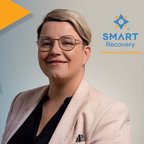
The "Prison to Community" Program: A Promising Approach to Reducing High-risk Recidivism in Israel (PID019)
Workshop Session
The "Prison to Community" Program: A Promising Approach to Reducing High-risk Recidivism in Israel (PID019)
2pm – 2.30pm EDT, 5 September 2024 ‐ 30 mins
Workshop Session
The Israel Prison Service's "Prison to Community" program aims to reduce high recidivism rates among criminal prisoners not granted conditional release. The program focuses on providing a comprehensive support system through collaboration with community organizations, as legal restrictions prevent direct contact between IPS staff and released prisoners. The research branch of the IPS is conducting an ongoing evaluation to identify factors contributing to successful reintegration and desistance from crime. Preliminary results, comparing program participants released in 2023 with a matched group, show that the matched prisoners were arrested 2.9 times more often than the research group over an average release period of three months. Although early, these preliminary findings suggest the program's approach of addressing multiple needs during reintegration may be effective in reducing recidivism. The "Prison to Community" program offers valuable insights and potential strategies for the field of corrections and prisons, highlighting the importance of community collaboration and comprehensive support in promoting successful community reentry.Speakers
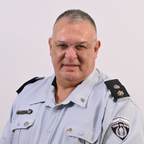
Lt Col Yohanan Ouaknine PhD
Head of the Research Branch, Israel Prison Service, Israel
Children: The Unintended Victims of Parental Incarceration: Supporting Families Through Collaborative Interventions by Singapore's Child Protective Service (PID134)
Workshop Session
Children: The Unintended Victims of Parental Incarceration: Supporting Families Through Collaborative Interventions by Singapore's Child Protective Service (PID134)
2pm – 2.30pm EDT, 5 September 2024 ‐ 30 mins
Workshop Session
The presentation will emphasise the importance of collaborative interventions between various other Ministries and community partners to support the successful rehabilitation of incarcerated parents into safe and responsible caregivers, and the positive impact it has on the children’s long-term well-being and safety. The presentation will also be substantiated with case studies, collaborative projects with other agencies and practice tools developed by CPS.
Speakers

Ianthe Leong
Senior Manager, Ministry of Social and Family Development, Rehabilitation and Protection Group, Child Protective Service

Josephine Overee
Assistant Director, Ministry of Social and Family Development, Rehabilitation and Protection Group, Child Protective Service

Perummalammal Valimuthu
Senior Assistant Director, Ministry of Social and Family Development, Rehabilitiion and Protection Group, Child Protective Service
Rehabilitation Dog Services for Persons in Custody in Hong Kong (PID079)
Workshop Session
Rehabilitation Dog Services for Persons in Custody in Hong Kong (PID079)
2pm – 2.30pm EDT, 5 September 2024 ‐ 30 mins
Workshop Session
In this presentation, the speaker will provide an overview of the introduction of animal-assisted intervention and the establishment of the Rehabilitation Dog Services in the Hong Kong Correctional Services Department. The focus of the presentation is on the process of service development, which includes conducting a literature review, consulting with experts, and conducting trial runs of animal-assisted treatment groups. The successful trial run of the animal-assisted treatment groups demonstrated prominent efficacy in improving the mental well-being of female inmates, specifically in reducing depression, anxiety, and stress levels. This success ultimately led to the official establishment of the Rehabilitation Dog Services in January 2024. These services involve specially trained therapy dogs and skilled handlers who regularly provide animal-assisted interventions within correctional institutions. Moreover, clinical psychologists are involved in conducting animal-assisted treatment to address specific mental health concerns of inmates, such as trauma, anxiety, and other emotional issues. Going forward, the Rehabilitation Dog Services aim to expand their reach to benefit more persons in custody, while also conducting research to ensure the program is evidence-based and adheres to best practices in programming.Speakers

Spiritual Care in Detention: Human Right, Necessity, Instrument or...? (PID111)
Workshop Session
Spiritual Care in Detention: Human Right, Necessity, Instrument or...? (PID111)
2pm – 2.30pm EDT, 5 September 2024 ‐ 30 mins
Workshop Session
Spiritual care in prisons is usually based on fundamental human rights, as stated in many constitutions. In The Netherlands, the delivery of spiritual care services in prisons is organised in quite a special dual-parity form, offering spiritual care by almost 250 spiritual caregivers of eight different religious, spiritual and philosophical backgrounds.What kind of advantages are met by organising spiritual care in this way and, more in general, what kind of advantages are generated by offering spiritual care in prison. Is this service just a constitutional obligation of is it a bare necessity for safe and humane prison-conditions? And how does spiritual care contribute to desistance of future criminal behaviour and more positive re-integration into society?
Speakers
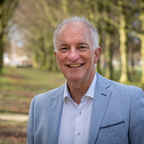
Drs Rien Timmer
Director Spiritual Care Service, Custodial Institutions Agency (DJI), The Netherlands
The Use of Data to Contribute to Desistance (PID199)
Workshop Session
The Use of Data to Contribute to Desistance (PID199)
2pm – 2.30pm EDT, 5 September 2024 ‐ 30 mins
Workshop Session
The Singapore Prison Service (SPS) leverages data analytics to enhance inmate rehabilitation and reintegration, aiming to reduce recidivism and promote desistance from crime. This presentation outlines the comprehensive data driven strategies employed by SPS, including the collection and analysis of various data points throughout an inmate's incarceration. Special emphasis is placed on SPS's innovative approach to measuring desistance, moving 1 beyond traditional recidivism rates to explore factors that contribute to successful reintegration. The study's findings, highlighting the importance of tailored interventions and the potential of alternative desistance indicators, showcase SPS's commitment to advancing correctional practices through data. The use of analytics not only informs programme development and policy but also offers deeper insights into the rehabilitative process, ultimately supporting ex-offenders' journey towards a crime-free life.Speakers

Ms Shermaine Chionh
Assistant Director (Data & Analytics Branch), Singapore Prison Services
Rehabilitation Programs (in-prison and in-community) both criminogenic and general (PID135)
Workshop Session
Rehabilitation Programs (in-prison and in-community) both criminogenic and general (PID135)
2pm – 2.30pm EDT, 5 September 2024 ‐ 30 mins
Workshop Session
Speakers

Tey Hock Soon
Malaysia Prison Department, Deputy Director Of Inmates Management Division (Vocational And Industry Section)
Harmonising Justice Health Cohort Data Across Jurisdictions: How and Why? (PID207)
Workshop Session
Harmonising Justice Health Cohort Data Across Jurisdictions: How and Why? (PID207)
2.30pm – 3pm EDT, 5 September 2024 ‐ 30 mins
Workshop Session
Health outcome for people released from incarceration are typically poor. Rates of mortality are markedly higher than in prison or among the general community. Rates of nonfatal overdose, self-harm, injury, and relapse to risky substance use and mental illness are all too common. However, internationally relatively few studies have been able to quantify these outcomes or identify modifiable risk factors. Furthermore, most studies have suffered from relatively small (often selected) samples that limit the utility and generalisability of the data. In this presentation I will describe two projects that have harmonised data from cohort studies of people released from incarceration. The Mortality After Release from Incarceration Consortium (MARIC) has harmonised data on mortality outcomes across 30 cohorts of people released from prisons in 12 countries (>1.5 million people). The Health After Release from Prison (HARP4) study has harmonised survey, clinical and linked administrative data from four prospective cohort studies of adults released from prisons in four Australian states (N=4,232). In this presentation I will provide an overview of these studies, consider why harmonising health data across cohorts and jurisdictions is important, and facilitate a discussion on the importance of robust, generalisable evidence to inform throughcare policy and practice.Speakers

(CANCELLED) Role of Community Engagement: Can Community Involvement Help With Reform and Desistance? (PID142)
Workshop Session
(CANCELLED) Role of Community Engagement: Can Community Involvement Help With Reform and Desistance? (PID142)
2.30pm – 3pm EDT, 5 September 2024 ‐ 30 mins
Workshop Session
In recent years, many jurisdictions in the US have called for using community engagement to reform the US criminal legal system and to engage the people and communities most directly impacted and harmed by the system in discussion regarding prison reform. At the same time, there has been more focused attention paid to the role of previously incarcerated individuals and community groups as primary agents of action in the system’s response to returning offenders. If they are to become involved in a productive way in the reentry process, they need to be effectively engaged and supported. 2 People with lived experience, who know the most about the problem, their families and friends, and people impacted by violence have so many qualms about how the current criminal and incarceration systems are designed not to help,but to fail justice-involved people. To help with desistance and stop the revolving door, people want to see rehabilitation and treatment at the core of the system, as opposed to punishment. And they want to see alternative programs and initiatives that address the root causes of incarceration. The benefits, both to the individual and to the public, of engaging communities and involving persons with lived experience are many. There are, however, still obstacles to overcome before it is possible to fully include their voices at all levelsSpeakers

Texas’ Strength Through Restoration, Independence, Vision and Empowerment (STRIVE) Reentry Program (PID028)
Workshop Session
Texas’ Strength Through Restoration, Independence, Vision and Empowerment (STRIVE) Reentry Program (PID028)
2.30pm – 3pm EDT, 5 September 2024 ‐ 30 mins
Workshop Session
Learn how the Texas Department of Criminal Justice and Windham School District have taken a cooperative approach to success by sharing and applying innovative practices in areas that support institutional security and student and community-based outcomes. This presentation will detail the value and application of the Strength Through Restoration, Independence, Vision and Empowerment (STRIVE) reentry program for women that emphasizes the importance of humanistic language, social-emotional learning, workforce readiness and pre-reentry employment. The presentation will include multiple video clips demonstrating student and employer engagement with persons who are incarcerated or formerly incarcerated. The clips will include brief interviews, commentaries and demonstrations.Speakers



Douglas Dretke
Director of the Office of Comparative and International Education and Leadership, Sam Houston State University, United States
Real Impact in Action: Serco Asia Pacific's Community Engagement Initiatives in Rehabilitation and Reintegration (PID060)
Workshop Session
Real Impact in Action: Serco Asia Pacific's Community Engagement Initiatives in Rehabilitation and Reintegration (PID060)
2.30pm – 3pm EDT, 5 September 2024 ‐ 30 mins
Workshop Session
Serco Asia Pacific has implemented a community engagement strategy that significantly benefits both the communities they serve and the individuals in their care. The approach focuses on rehabilitation, reintegration, and enabling desistance through various projects. The Clarence Correctional Centre has been at the forefront of this initiative, integrating inmates into local community projects, which has shown to improve their chances of employment and success post-release.Feedback from inmates has been overwhelmingly positive, indicating an enhanced sense of purpose and self-worth. This has been further supported by case studies demonstrating the effectiveness of these programs in aiding the transition back into society and reducing recidivism. The commitment to community partnership and the tangible results seen in inmate rehabilitation highlight the success of this approach.
Speakers


Cherie Goodwin
Manager Inmate Services, Clarence Correctional Centre , Serco Asia Pacific
Chaos Goes Both Ways: Aspects of the Co-Constitution of Chaos in the Australian Criminal Justice System That are Relevant When Addressing Desistance and Recidivism (PID102)
Workshop Session
Chaos Goes Both Ways: Aspects of the Co-Constitution of Chaos in the Australian Criminal Justice System That are Relevant When Addressing Desistance and Recidivism (PID102)
2.30pm – 3pm EDT, 5 September 2024 ‐ 30 mins
Workshop Session
Violent offenders are often depicted as chaotic, whereas the chaos these individuals encounter in criminal justice institutions is not commonly reported. However, we found in qualitative offender-based research on diversion and other aspects of the criminal justice system that chaos can be co-constituted. We believe it is important to understand this phenomenon to create effective, humane criminal justice programs that can support desistance. Our findings are drawn from qualitative research on ReINVEST a pharmacotherapy Randomized Controlled Trial (RCT) at UNSW, Sydney, Australia. Using Grounded Theory Analysis to analyse the 32 in-depth interviews conducted, and Law (2004) and Lock & Nguyen’s (2010) innovative theories of “mess” and “entanglement” respectively, we discovered that the co-constitution of chaos can result from: the complexity and entangling of individuals and institutions, conflicting cultures and practices, dysfunction in criminal justice institutions, and issues with communication and relationality between individuals and institutions. Linking these aspects of chaos with participants reports of chaos and dysfunction in their lives and criminal justice institutions, we emphasise the need to acknowledge and encourage healthy relationality and strong emotional intelligence and labour between criminal justice professionals and criminal justice involved individuals. We advocate for policy and practice that directs these individuals away from the criminal justice system into treatment and rehabilitation. It is vital that those creating such policy and practice understand the importance of emotional intelligence and healthy communication, the entangling of individuals, systems, and processes, and the co-constitution of chaos.Speakers
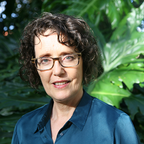
Dr Patricia Morgan
Senior Research Associate, Justice Health, School of Public Health, Faculty of Medicine, Australia
Reducing recidivism through reintegration programs in prison: Rehabilitation Programs for Drug-abuse in Thai Correctional Settings (PID211)
Workshop Session
Reducing recidivism through reintegration programs in prison: Rehabilitation Programs for Drug-abuse in Thai Correctional Settings (PID211)
2.30pm – 3pm EDT, 5 September 2024 ‐ 30 mins
Workshop Session
Thailand has the sixth-highest prison population globally, the third of Asia and the first among ASEAN member states with approximately 271,000 inmates in 142 prisons. The ratio of staff to inmates is around 1 to 20, which can increase during weekends. This situation leads to overcrowding and challenges in prison management, including manpower shortages, inadequate infrastructure, and limited access to resources.Upon admission, The Department of Corrections (DOC) conducts an evaluation process that includes health screening, orientation, and classification. This process aims to identify inmates' issues and create individualized sentence plans by a committee. Drug rehabilitation programs are integrated into these processes. Inmates with drug abuse problems receive treatment and rehabilitation during their sentences. These programs provide inmates with the necessary support and resources to address their substance abuse issues and prepare them for a successful return to their communities.
Pre-release preparation is provided, and post-release support is available through the Center for Assistant to Reintegration and Employment (CARE). Follow-up is provided after release through the National Drug Treatment Network (NTND) or referral to Community Rehabilitation Centers.
Statistics from 2019-2023 indicate that pre-release drug rehabilitation programs have significantly reduced recidivism rates. The duration of intervention does not impact recidivism, but the timing of intervention does. Prisoners released upon completion of sentences have the highest recidivism rate, Parole ex-prisoners have the lowest recidivism rate under probation conditions. Overall, the study highlights the crucial role of drug rehabilitation programs in reducing recidivism and supporting the reintegration of drug-abuse offenders into society.
Speakers

Sappasit Phoomsuk
Medical Science Technician/ Head of Narcotics Rehabilitation Section, Department of Corrections, Thailand
Exploring the Role of Ethics in Inmate Resocialization: A Pilot Program from Tallinn Prison, Estonia (PID067)
Workshop Session
Exploring the Role of Ethics in Inmate Resocialization: A Pilot Program from Tallinn Prison, Estonia (PID067)
2.30pm – 3pm EDT, 5 September 2024 ‐ 30 mins
Workshop Session
Speakers


Coffee Break and Exhibition
Coffee Break
Coffee Break and Exhibition
3pm – 3.30pm EDT, 5 September 2024 ‐ 30 mins
Coffee Break
We Could All Use a Coach: How a Coaching Model for Corrections has Transformed Culture (PID039)
Plenary Session
We Could All Use a Coach: How a Coaching Model for Corrections has Transformed Culture (PID039)
3.30pm – 4.30pm EDT, 5 September 2024 ‐ 1 hour
Plenary Session
The American corrections system is hyper focused on punishment. But focusing on punishment comes at a dear cost. Staff are more likely to have significant consequences to both their physical and mental health. Seventy percent of the people incarcerated end up being rearrested within five years of release. This presentation will challenge the century old models of corrections, offering a new perspective to the work. A Coaching Model for Corrections transforms the staff from referees to coaches and opens the door for the development of player-coaches. Staff as coaches change their roles from catching people failing to helping people live within the rules. Similarly, player-coaches provide opportunities for people who remain incarcerated to be a coach for the newer people, creating a mentor-like environment to help people move forward. The presentation will inspire participants to reorient their systems to employ coaches while also shifting the role of people who have been in the system to player-coaches.Speakers


Invitation to Rwanda, 2025
Plenary Session
Invitation to Rwanda, 2025
4.30pm – 4.45pm EDT, 5 September 2024 ‐ 15 mins
Plenary Session
Closing Speech
Plenary Session
Closing Speech
4.45pm – 4.55pm EDT, 5 September 2024 ‐ 10 mins
Plenary Session
Speakers

Closing Remarks
Plenary Session
Closing Remarks
4.55pm – 5pm EDT, 5 September 2024 ‐ 5 mins
Plenary Session
Speakers

Institution A3
Prison Visits
Institution A3
7.30am – 12pm EDT, 6 September 2024 ‐ 4 hours 30 mins
Prison Visits
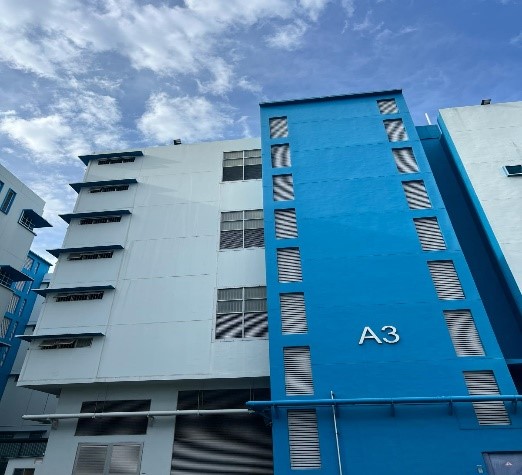
Institution A4
Prison Visits
Institution A4
7.30am – 12pm EDT, 6 September 2024 ‐ 4 hours 30 mins
Prison Visits
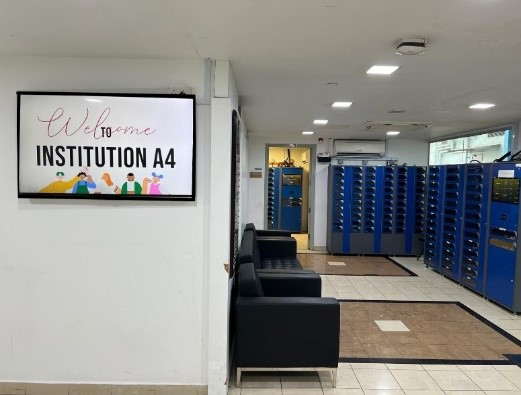
-
Video court facilities.
-
24/7 medical centre.
-
Psychiatric Correctional Unit.
-
Assisted Living Unit to address the needs of elderly inmates.
Institution S1
Prison Visits
Institution S1
7.30am – 12pm EDT, 6 September 2024 ‐ 4 hours 30 mins
Prison Visits
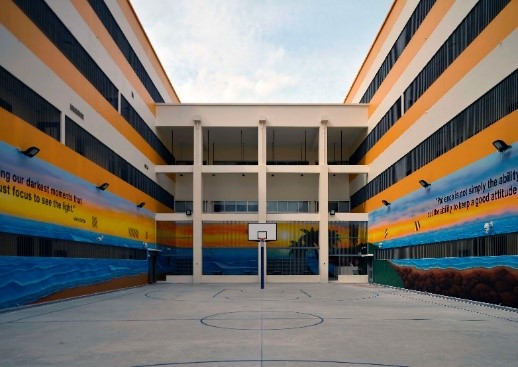
-
Facial Recognition System to identify and verify both staff and inmates through their facial features.
-
“Advanced Video Analytics to Detect Aggression” (AVATAR) system which uses video analytics to detect abnormal behaviour in cells such as fights to enable swift response to incidents.
Selarang Halfway House (SHWH) and Breakthrough Missions
Prison Visits
Selarang Halfway House (SHWH) and Breakthrough Missions
7.45am – 12.30pm EDT, 6 September 2024 ‐ 4 hours 45 mins
Prison Visits

Rise Above Halfway House & ISCOS Community Space
Prison Visits
Rise Above Halfway House & ISCOS Community Space
7.45am – 12.30pm EDT, 6 September 2024 ‐ 4 hours 45 mins
Prison Visits
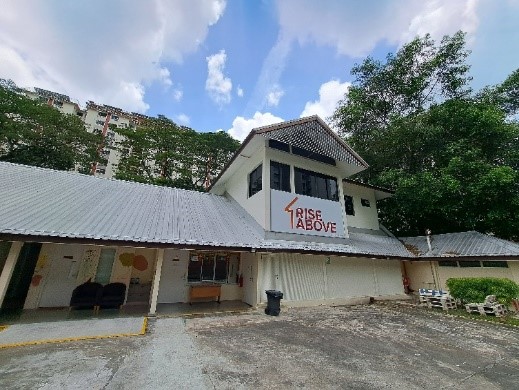
Institution B1
Prison Visits
Institution B1
8am – 12pm EDT, 6 September 2024 ‐ 4 hours
Prison Visits
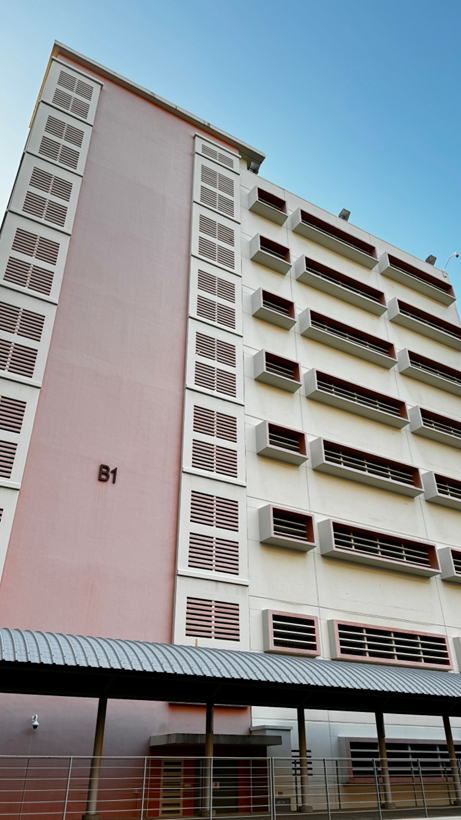
Institution B3
Prison Visits
Institution B3
8am – 12pm EDT, 6 September 2024 ‐ 4 hours
Prison Visits
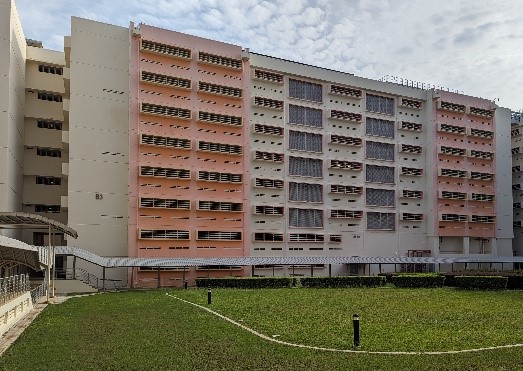
Institution B4
Prison Visits
Institution B4
8am – 12pm EDT, 6 September 2024 ‐ 4 hours
Prison Visits
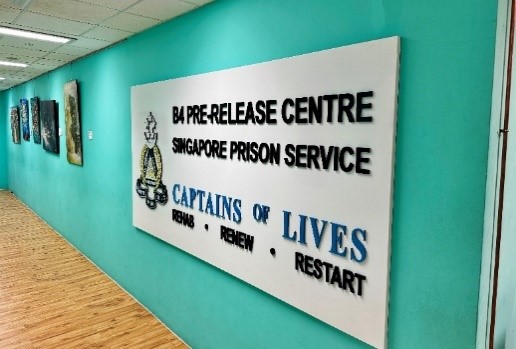
-
“Hope Café” where inmates undergo hands-on training in culinary skills and food and beverage operations.
-
Logistics workshop where inmates undergo training in warehouse and logistics management.
-
“Visual Arts Hub” where artistically inclined inmates receive training in different art forms.
Institution S2 & Selarang Park Community Supervision Centre
Prison Visits
Institution S2 & Selarang Park Community Supervision Centre
8.15am – 12.30pm EDT, 6 September 2024 ‐ 4 hours 15 mins
Prison Visits
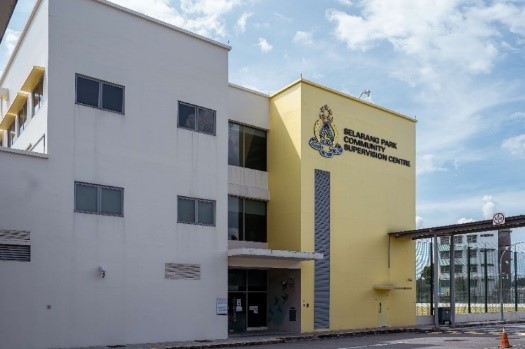
-
“Prison Automated Screening System” which is an automated urine screening system.
-
“Electronic Monitoring Services” which is an electronic tagging system for effective tracking and monitoring of supervisees in the community.
-
“Self-Help and Rehabilitation E-Application” which is a mobile application for supervisees with self-help resources and features.
Institution TM1
Prison Visits
Institution TM1
8.15am – 12.30pm EDT, 6 September 2024 ‐ 4 hours 15 mins
Prison Visits
